|
Alternative Futures and the Present
: Postcolonial Possibilities
This book explores the idea that alternatives to our present condition are available in the present, such that a search for alternatives must involve rigorous study of some of its central texts, events, and thinkers.
Through engagement with selected modern thinkers, texts, and events, it imagines a different future from the position of the current postcolonial moment, indicating the possibilities that emerge from the present and which shape contemporary radical thinking.
An invitation to imagine a possible future marked with alternative possibilities of conducting struggles, and living through contentions and social restructuring, it will appeal to scholars with interests in social and political theory, political philosophy, colonialism and postcolonialism, and historical materialism.
To procure the
book, please contact Springer has
published it / Authored by Ranabir Samaddar |
|
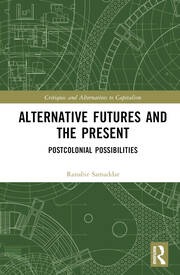 |
|
The Long 2020: Reflections of Epidemiological Times
This book brings together scholars from different fields to think of our present during the time of COVID-19 pandemic in a longer temporal frame. It looks at the current crises of life and livelihood following the global epidemiological crisis and various strategies to manage them as a long unfolding of past trends and future possibilities of epidemiological governance, restructuring of economy and public health policies, systems of protection and care, and the role of state in that. The articles compiled here range from historical narratives, ethnographic accounts, socio-economic analyses to more conceptual and theoretical pieces. Along with this notion of the ‘long’, the chapters collected in this volume have variously deployed the Braudelian idea of the longue durée, insights from medical and environmental histories, and the debates and discussion around the concept of the Anthropocene to understand the structural components of epidemiological crises at different moments of early modern and modern history.
To procure the
book, please contact Springer has
published it / Edited by Subhas Ranjan Chakraborty, Paula Banerjee and Kaustubh Mani Sengupta |
|
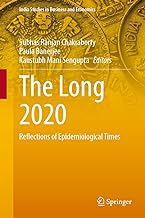 |
|
Mahamari ki Sarhaden: Covid-19 aur Pravasi Shramik
(Hindi)
To procure the
book, please contact Aakar Books has
published it / Edited by Anamika Priyadarshini and Gopal Krishna |
|
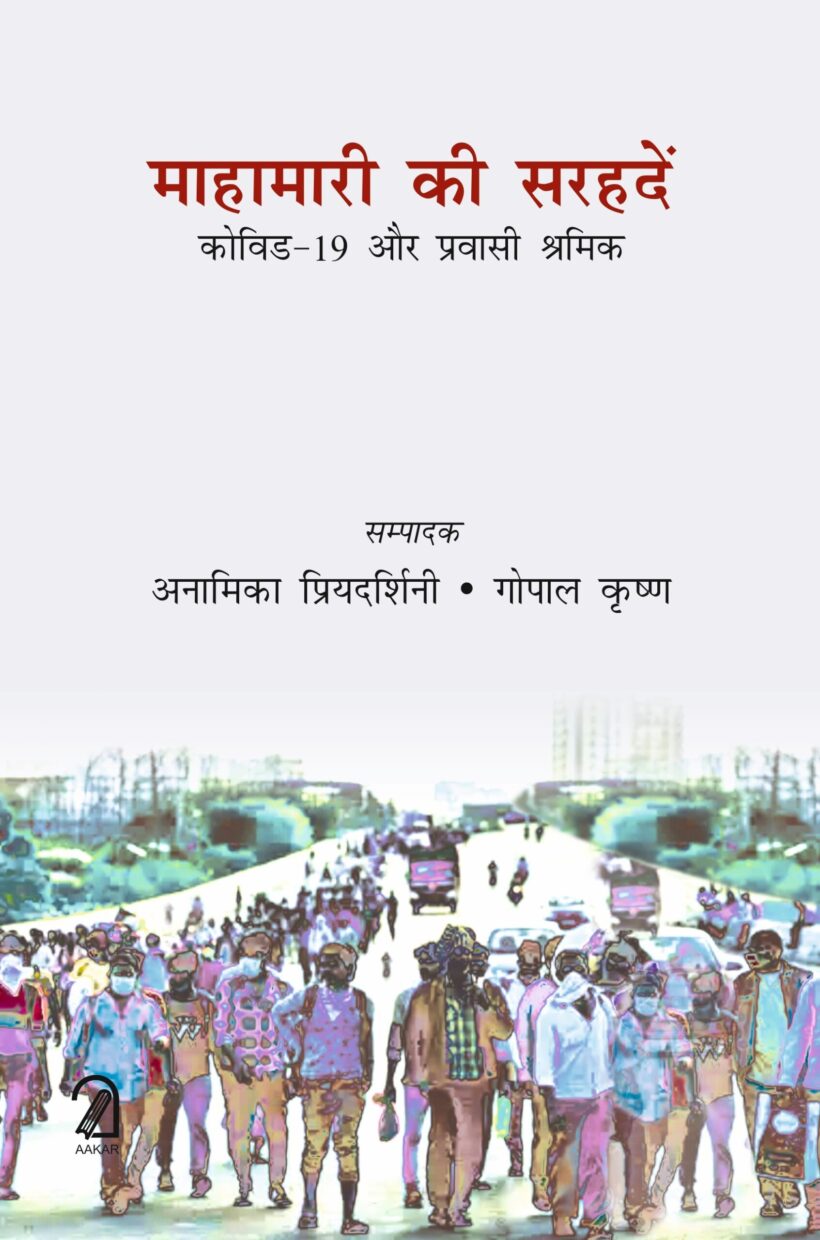 |
|
Labour Train
A lattice of bodies packed themselves in the train while a sundry arm here or a sundry limb there dangled from the doors and windows of the train as it chugged off the station. Which train is it? Farakka Express, though locals of Malda Town call it the Labour Train. It goes to Delhi. Every day thousands of labourers go to places like Delhi, Mumbai, Haryana, Kerala from various parts of West Bengal. Sometimes they return…at times, their dead bodies or even worse, only the news of their death arrives. During the Lockdown, these people have been given a new identity––migrant labour. Their lives are now part of the breaking news or headlines. Labour Train is all about these people and their lives––before and after they turned to headlines.
To procure the
book, please contact Frontpage has
published it / Translated by Purna Banerjee |
|
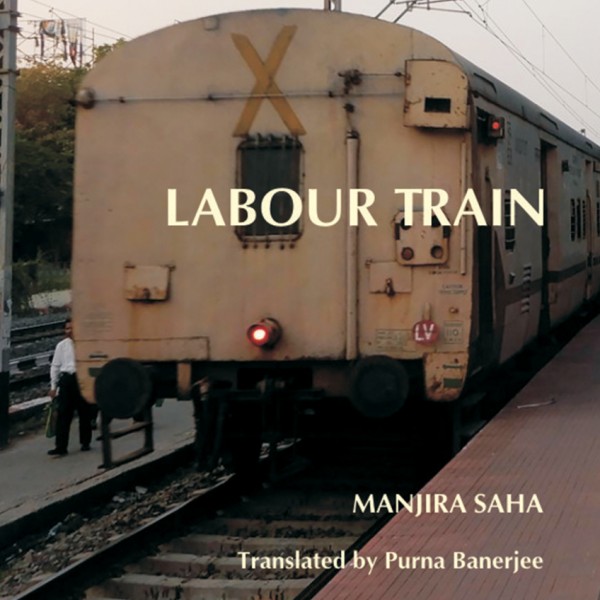 |
|
Living with the Weather: Climate Change, Ecology and Displacement in South Asia
How does climate change intensify social cleavages in new configurations of knowledge and power? How does development respond to its own contradictions in such scenarios? How do extreme weather events inform population movement and challenge existing definitions of borders and citizenship? Who pays the heaviest price? Living with the Weather addresses these pressing questions by highlighting and exploring the social, economic, political, and spatial dimensions of climate disaster in South Asia.
Through empirical research, reporting and documentation of the climate crisis in the countries of South Asia, along with a deep dive into the Indian Sundarbans, the book calls attention to the intermeshed predicaments the people of the subcontinent face while bearing the brunt of climate change In doing so, it seeks to enrich our understanding of how climate change transforms everyday life. It makes visible the effects of natural events, the outcomes of political decisions, how disaster and rehabilitation are interpreted by states, how resistances are staged in the form of mobility, and how dispossession and despair are embodied and articulated.
To procure the
book, please contact Yoda Press has
published it /
Edited
by
Piya Srinivasan |
|
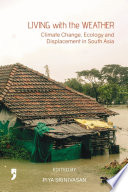 |
|
Media, Migrants and the Pandemic in India: A Reader
The national lockdown to contain the COVID-19 pandemic in India resulted in the loss of work and displacement of thousands of urban migrant workers. This book records the arduous journey home for many of these workers and analyses the grave effects the pandemic has had on jobs, livelihoods, and the health of urban migrant workers.
A rich compilation of deep analytical articles by journalists, academics, lawyers, and social activists, this book explores various facets of the crisis as it unfolded. It examines the welfare policies of state and central governments and discusses the role of the judiciary and the public policy response to the unemployment, health risks, and mass migration of workers. It also offers readers a better understanding of the complexities of the migrant crisis, how it unfolded, and how it was addressed by the media.
This timely and prescient book will be of great interest to the general reader as well as researchers and students of media studies, journalism, sociology, law, public policy, labour and economics, welfare economics, gender studies, and development studies.
To procure the
book, please contact Routledge has
published it /
Edited
by
Bharat Bhuhsan |
|
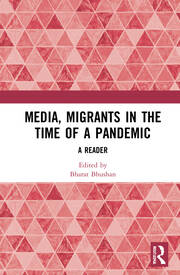 |
|
Imprints of the Populist Time
The crisis of liberal democracy in the neoliberal world—marked by massive labour flows, migrations, and informal conditions of work—has led to the emergence of new forms of claim-making and a new sense of rights even as governments try to garner popular support and legitimacy through strategies termed as ‘populist’ gestures. Today, populism is integral to the daily discourse of politics and discussions of democracy, governance, and people.
Imprints of the Populist Time investigates populism as a historical phenomenon, examining its dynamic nature and role as a set of specific political practices. Lending a postcolonial perspective to the global study of populism, Ranabir Samaddar examines the trajectory that West Bengal politics took following the end of Left Front rule in 2011.
Through a fragmented narrative structure that builds on commentaries on contemporary events ,which highlight the recent history of populism in West Bengal, the volume explores how populism works around the ‘crisis of representation’ in democracy by centring the subaltern and constructing a ‘people’; the problematic figure of the ‘citizen’; popular engagements with the Constitution; the city as a crucial site of contemporary populism; the role of gender in populist governance; and the counter-intuitive economic logic of the populists.
The volume studies various modes of populism—elections, the language of populist politics, and the rampant ‘illegalism’ in populist conduct, and asks key questions: Has there ever been any democracy without populism, or any nationalism without its populist articulation? Can we think of the popular and the people without the populist? Is populism a form of subaltern resistance to neoliberal depredations?
Scholars and students of Indian politics, political historians, journalists, policy makers, and informed readers will find this volume riveting.
To procure the
book, please contact Orient BlackSwan has
published it /
Authored
by Ranabir Samaddar |
|
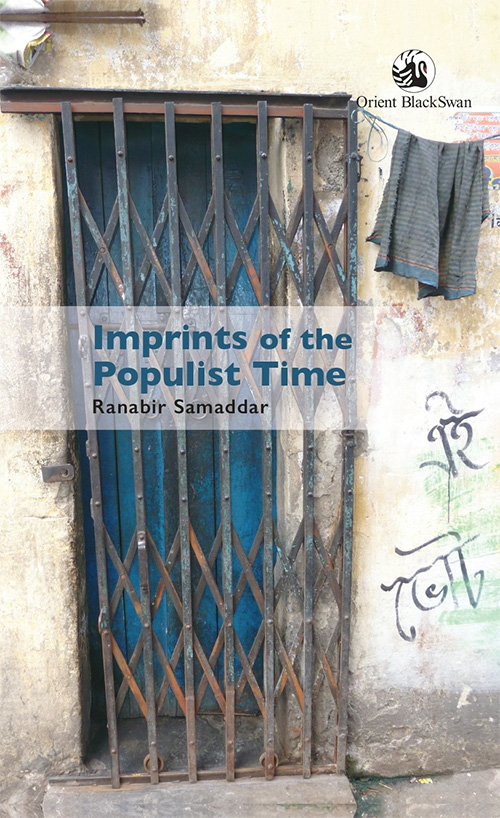 |
|
|
|
|
|
Data Centres as Infrastructure: Frontiers of Digital Governance in Contemporary India
Data Centres (DCs) have emerged as the key infrastructure for amassing and processing the lifeblood of the globalised digital economy—data. So far, the digital economy has been studied in terms of information technology labour, regimes of privacy or data protection, and the implications of living in an increasingly connected world.
Data Centres as Infrastructure goes beyond technical/business-oriented accounts of DCs and views them as both an object and a principle of governance in India, one of the world's most prominent rising markets for DCs. The authors understand DCs not just as technical infrastructure, but as political institutions that make and exercise new forms of power while negotiating state and capital in the postcolonial nation.
Taking a historical and sociological approach to DCs, this volume explores actual social contexts of policy-making and practice in relation to problems of digitalisation that inflect the way in which lives, commerce, and governance are shaped in India. Through case studies, the authors examine a ‘captive’ Data Centre deployed by the state-owned electricity discom— WBSEDCL, to highlight a specific techno-political issue—the theft of power and the ‘(un)management’ of its loss. The volume also examines the production of a new form of territoriality, economy, and polity in the Navi Mumbai area, known for being home to several large DCs. The Introduction highlights some of these concerns through a discussion of how the Indian state yields space to norms of corporatised governance while also enrolling new kinds of data-fied subjects through the Aadhaar project, demonetisation, and ‘data localisation’.
This novel contribution will interest scholars and policy professionals concerned about the social and political impact of the digital economy in India.
To procure the
book, please contact Orient BlackSwan has
published it /
Edited
by Manish K Jha and Ritam Sengupta |
|
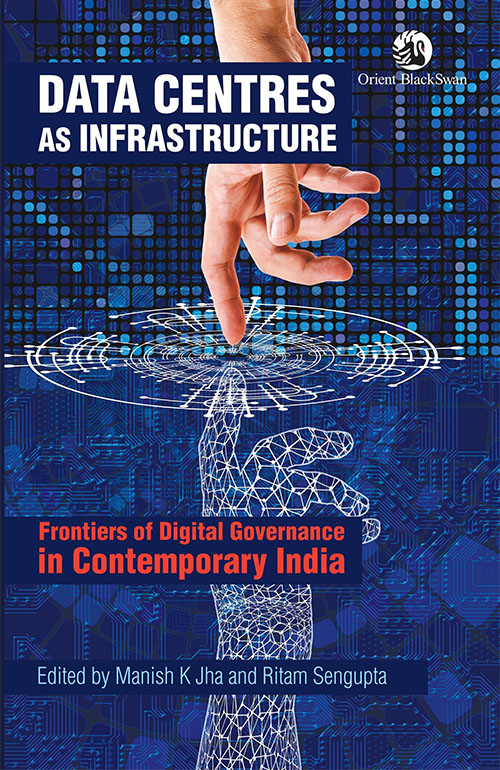 |
|
|
|
|
|
Logistical Asia: The Labour of Making a World Region
This book explores how the management science of logistics changes working lives and contributes to the making of world regions. With a focus on the port of Kolkata and changing patterns of Asian regionalism, the volume examines how logistics entwine with political power, historical forces, labour movements, and new technologies. The contributors ask how logistical practices reconfigure both Asia’s relation to the world and its internal logic of transport and communication. Building on critical perspectives that understand logistics as a political technology for producing and organizing space and power, Logistical Asia tracks how digital technologies and material infrastructure combine to remake urban and regional territories and produce new forms of governance and subjectivity.
To procure the
book, please contact Springer has
published it /
Edited by Brett Neilson, Ned Rossiter, Ranabir Samaddar |
|
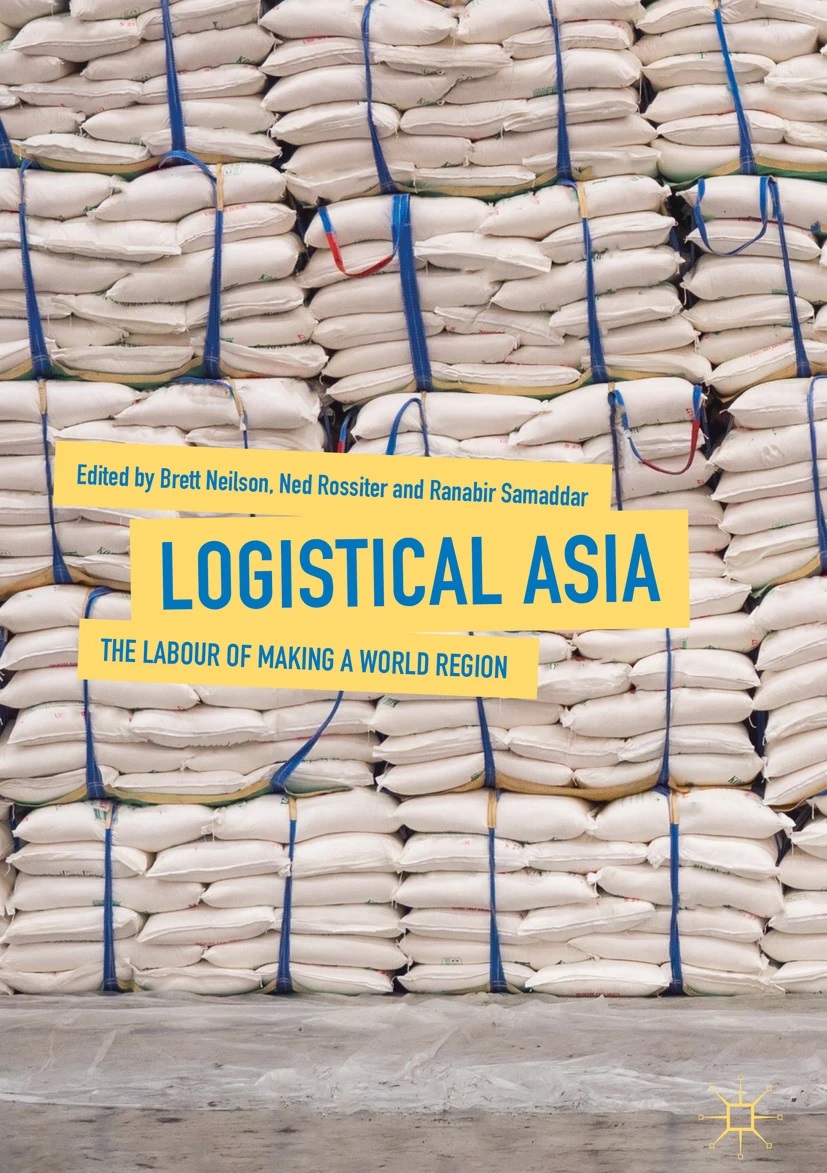 |
|
|
|
|
|
The Postcolonial Age of Migration
This book critically examines the question of migration that appears at the intersection of global neo-liberal transformation, postcolonial politics, and economy. It analyses the specific ways in which colonial relations are produced and reproduced in global migratory flows and their consequences for labour, human rights, and social justice. The postcolonial age of migration not only indicates a geopolitical and geo-economic division of the globe between countries of the North and those of the South marked by massive and mixed population flows from the latter to the former, but also the production of these relations within and among the countries of the North. The book discusses issues such as transborder flows among countries of the South; migratory movements of the internally displaced; growing statelessness leading to forced migration; border violence; refugees of partitions; customary and local practices of care and protection; population policies and migration management (both emigration and immigration); the protracted nature of displacement; labour flows and immigrant labour; and the relationships between globalisation, nationalism, citizenship, and migration in postcolonial regions. It also traces colonial and postcolonial histories of migration and justice to bear on the present understanding of local experiences of migration as well as global social transformations while highlighting the limits of the fundamental tenets of humanitarianism (protection, assistance, security, responsibility), which impact the political and economic rights of vast sections of moving populations.
Topical and an important intervention in contemporary global migration and refugee studies, the book offers new sources, interpretations, and analyses in understanding postcolonial migration. It will be useful to scholars and researchers of migration studies, refugee studies, border studies, political studies, political sociology, international relations, human rights and law, human geography, international politics, and political economy. It will also interest policymakers, legal practitioners, nongovernmental organisations, and activists.
To procure the
book, please contact Routledge has
published it /
Authored by Ranabir Samaddar |
|
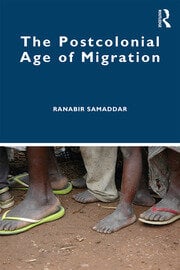 |
|
|
|
|
|
India's Migrant Workers and the Pandemic
A sudden announcement was made by the government on 24 March 2020 of a complete lockdown of the country, due to the spectre of Coronavirus. India’s Migrant Workers and the Pandemic was being written as the crisis was unfolding with no end in sight. Migrant workers from different parts of India had no choice but to trek back hundreds of kilometres carrying their scanty belongings and dragging their hungry and thirsty children in the scorching heat of the plains of India to reach home.
How did caste, race, gender, and other fault lines operate in this governmental strategy to cope with a virus epidemic?
The eight papers in this collection, highlight the ethical and political implications of the epidemic—particularly for India’s migrant workers. What were the forces of power at play in this war against the epidemic? What measures could have been taken and need to be taken now?
To procure the
book, please contact Routledge has
published it /
Edited by Ritajyoti Bandyopadhyay, Paula Banerjee, Ranabir Samaddar |
|
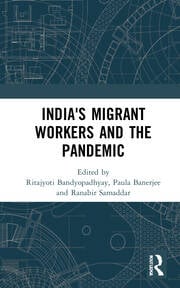 |
|
|
|
|
|
Gender, Identity and Migration in India
The book focuses on voices of displaced women who constitute a critical part of the migration process through an unravelling of the engendered displacement. It draws attention to the various processes, methods and approaches by national and international human rights and humanitarian laws and principles, and the experiences of the relevant communities, organisations towards peaceful co-existence. The contributions to this volume embellish the argument that there is a direct correlation between an academic researcher's positionality, methods and trajectories of critical knowledge production. In particular, feminist epistemologies with specific emphasis on post-coloniality utilized in conjunction with scholarship related to transnational migration studies constitute a distinctly powerful vantage point for challenging methodological nationalism and the syndrome of 'seeing like the state' in the area of forced migration studies.
To procure the
book, please contact Palgrave Macmillan has
published it /
Edited by Nasreen Chowdhory
& Paula Banerjee |
|
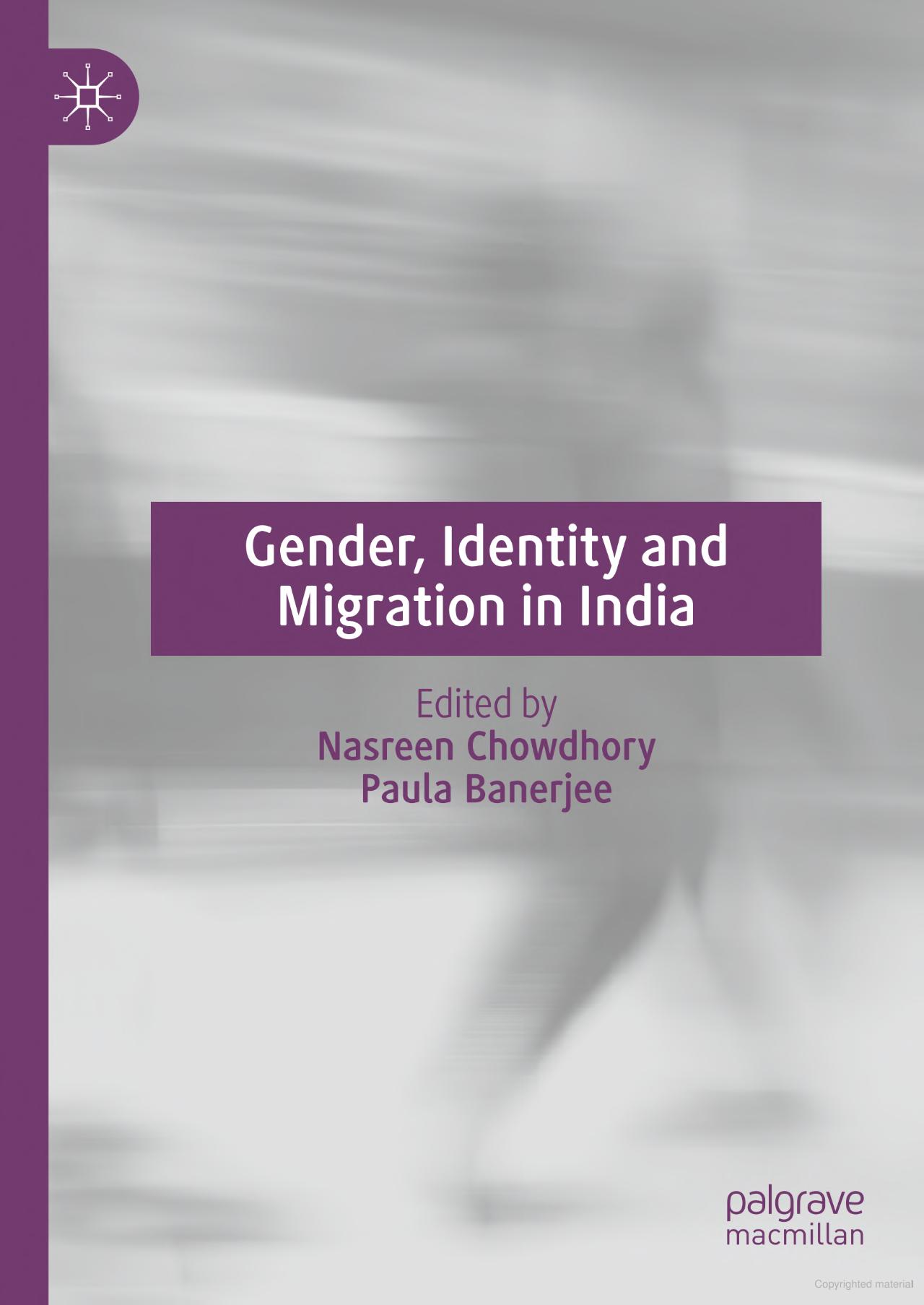 |
|
|
|
|
|
Migrants in Electoral Time: Reports on Assam, Bihar and West Bengal Assembly Elections, 2020-2021
In 2020, while protests against the new citizenship law were still rocking the streets of India, the COVID-19 pandemic hit the country. Subsequently, the year saw the largest internal migration in post-Independence India. It was an unprecedented reverse migration from urban centres to rural areas when hundreds of thousands of people who had come to the cities to earn a living were going back to their native places after a sudden nation-wide lockdown was imposed on 24 March 2020, bringing economic activities almost to a halt and making their livelihood uncertain.
Several Indian states went into elections later in 2020 and in 2021. How far did the migrants matter in these polls? How did the massive and mixed population of migrants in India – internal as well as cross-border migrants – figure in the electoral campaigns of the political parties?
This book presents three studies that take a hard look at the ground realities in three States that went to polls—Assam, Bihar and West Bengal—searching for an answer to this question.
Unlike most election studies that deal with in-situ voter communities, it not only brings the migrants in focus but also sees them as subjects and not mere consumers of the election campaigns.
To procure the
book, please contact frontpage has
published it /
Reports
on Assam, Bihar and West Bengal Assembly Elections,
2020-2021 |
|
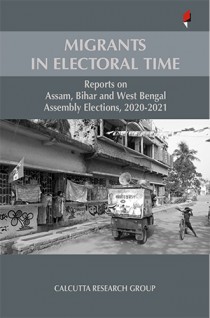 |
|
|
|
|
|
Mahamarir Nana Simanay: Covid-19 abong Parijee Sramik
(Bengali Publication)
To procure the
book, please contact
Calcutta
Research Group
which has
published it / Edited by Rajat Roy |
|
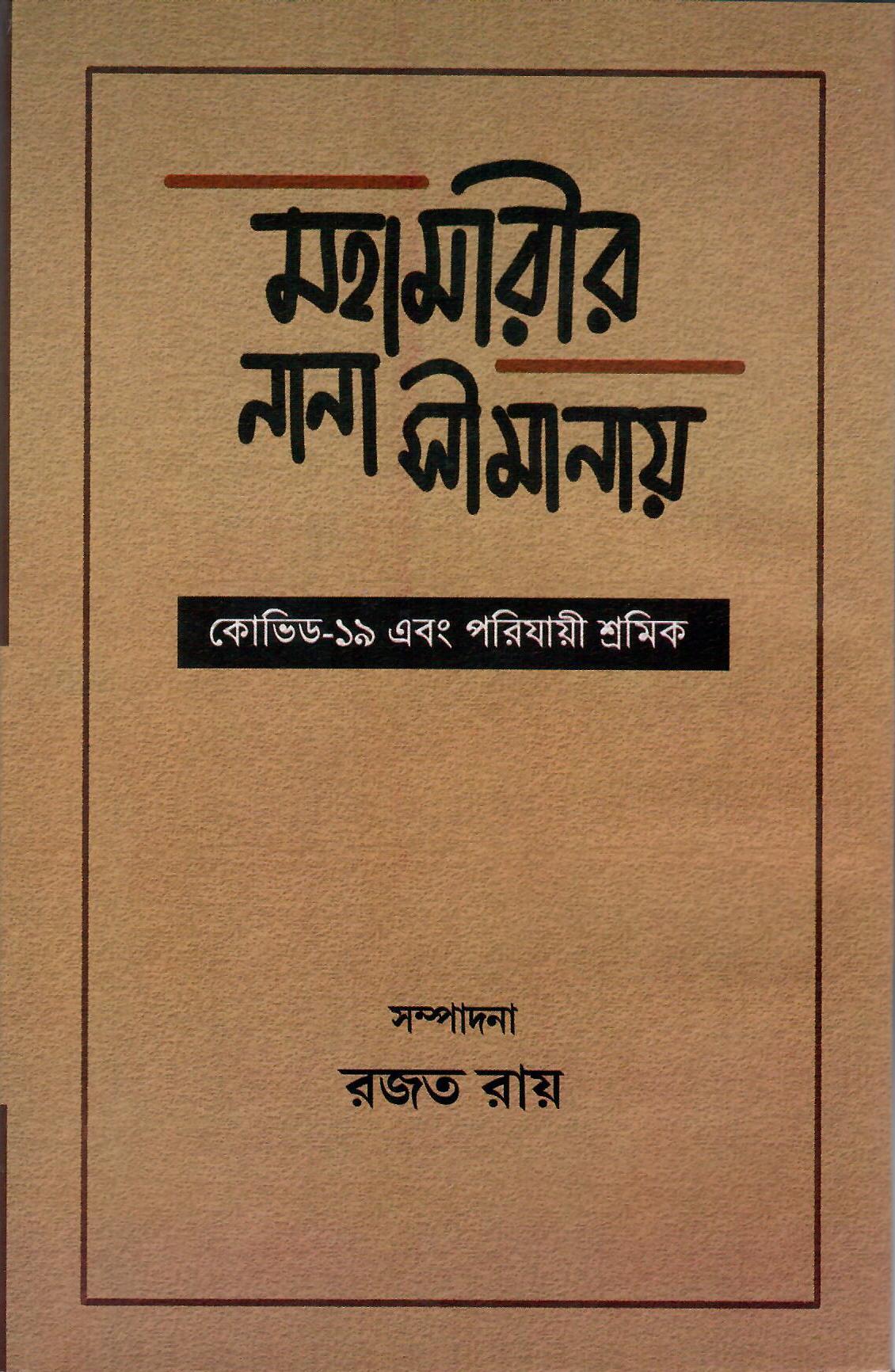 |
|
|
|
|
|
A Pandemic and the Politics of Life
Over one hundred million infections, and two million deaths, worldwide, with more than ten million cases and a lakh-and-a-half deaths in India. A Pandemic and the Politics of Life unravels the specifics of the Indian experience of battling COVID-19, while adopting an international perspective, in order to analyse the why and how of this public health emergency; the neoliberal response by the state; the production of an unanticipated politics of life; and the dramatic desire for a new kind of public power. Written during an intense time, this monograph closely follows the progress of the virus, focusing on three themes: (i) the outbreak as an epidemiological crisis compounded by an economic crisis, a migrant crisis, and a political crisis; (ii) the presence of the marching migrant as the figure of this crisis; and (iii) the emergence of bio-politics from below as a reaction of the lower classes. Over twelve months into 'fighting' this deadly virus, we now have a remedy in the form of a vaccine—but is that all the remedy we need? The author raises and answers some critical questions around the way issues of life and death are negotiated in a neoliberal order, and on what we mean by care, protection and solidarity in a post-COVID-19 world.
To procure the
book, please contact Women Unlimited which has
published it / Authored by Ranabir Samaddar |
|
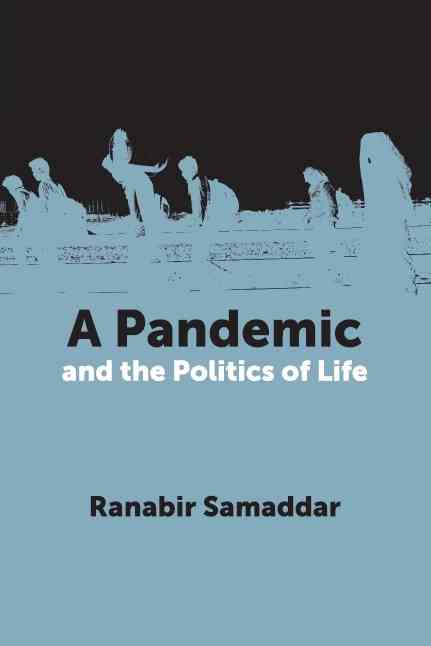 |
|
|
|
|
|
Populism and Populist Politics in South Asia with Special Reference to India -Bengali Publication
"In an era when Populism is the ‘Mantra’ of the global political order, leaders of many countries are seen to be riding on the Populist waves, be that right-wing or left-wing. Donald Trump in the USA, Jair Bolsonaro in Brazil, Recep Tayyip Erdogan in Turkey, Victor Orban in Hungary, Jeremy Corbyn in the UK, Marine Le Pen in France are some of the names that create populist waves of the day. In the past also, we have seen the rise of Juan Domingo Peron in Argentina, Hugo Chavez in Venezuela and some other leaders came to power riding on populist waves. India and South Asia have also witnessed the rise of populist trends in the not so recent past when Indira Gandhi, Zulfikar Ali Bhutto and Maulana Bhasani took the populist turn in their respective countries in the decade of 1970s. Today, the rise of AAP in Delhi can be traced back to the trend set by MGR-Jayalalitha in Tamil Nadu and N T Rama Rao in Andhra Pradesh. Even the politics of Mamata Banerjee in West Bengal today can be understood better and seen through the optics of Populism.
To understand the manifestations and its implications of Populist Politics in today’s life it is imperative to examine how the populist leaders articulate their politics in catchy phrases and mobilise popular support around them. With that in mind, CRG has published a book on Populism in Bengali recently. The book deals with both the theoretical concept of Populism as being understood globally and how it manifests somewhat differently in India. There are eight papers by scholars and other researchers that examine various aspects of it. A brief introduction by Prof. Ranabir Samaddar has tried to set the concept of the book on tracks. Perhaps it is the first of its kind in the Bengali language so far.
To procure the
book, please contact Calcutta Research Group which has
published it / Edited by Sibaji Pratim Basu & Rajat Roy |
|
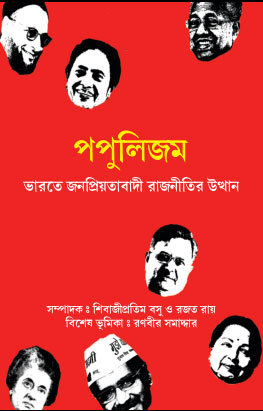 |
|
|
|
|
|
Burdens of an Epidemic : A Policy Perspective on COVID-19
and Migrant Labour
Burdens of an Epidemic: A Policy Perspective on Covid-19 and Migrant Workers comes out close on the heels of Borders of an Epidemic. Borders of an Epidemic was documentary in nature. Burdens of an Epidemic analyses the issue of migrant labour from several dimensions of the epidemic. The purpose of this tract is to present a policy perspective of the contemporary situation and to draw out in the open the policy contexts of the reports published in the earlier book. This perspective on the policy world compels us to face the question: Who bears the burden of the epidemic and epidemic control measures? Who pays – finally in terms of life and livelihood? The question takes us to the heart of the rights framework, namely the issue of justice. The analysis points out how an epidemic control policy seen purely in terms of the mechanism of lock down and other administrative measures becomes deaf to the call for justice. The crisis of Covid-19 raises the question of life to be protected and renewed by a different vision of public health. The issue is one of life itself.
To procure the
book,
Please contact Calcutta Research Group / Edited by Ranabir Samaddar |
|
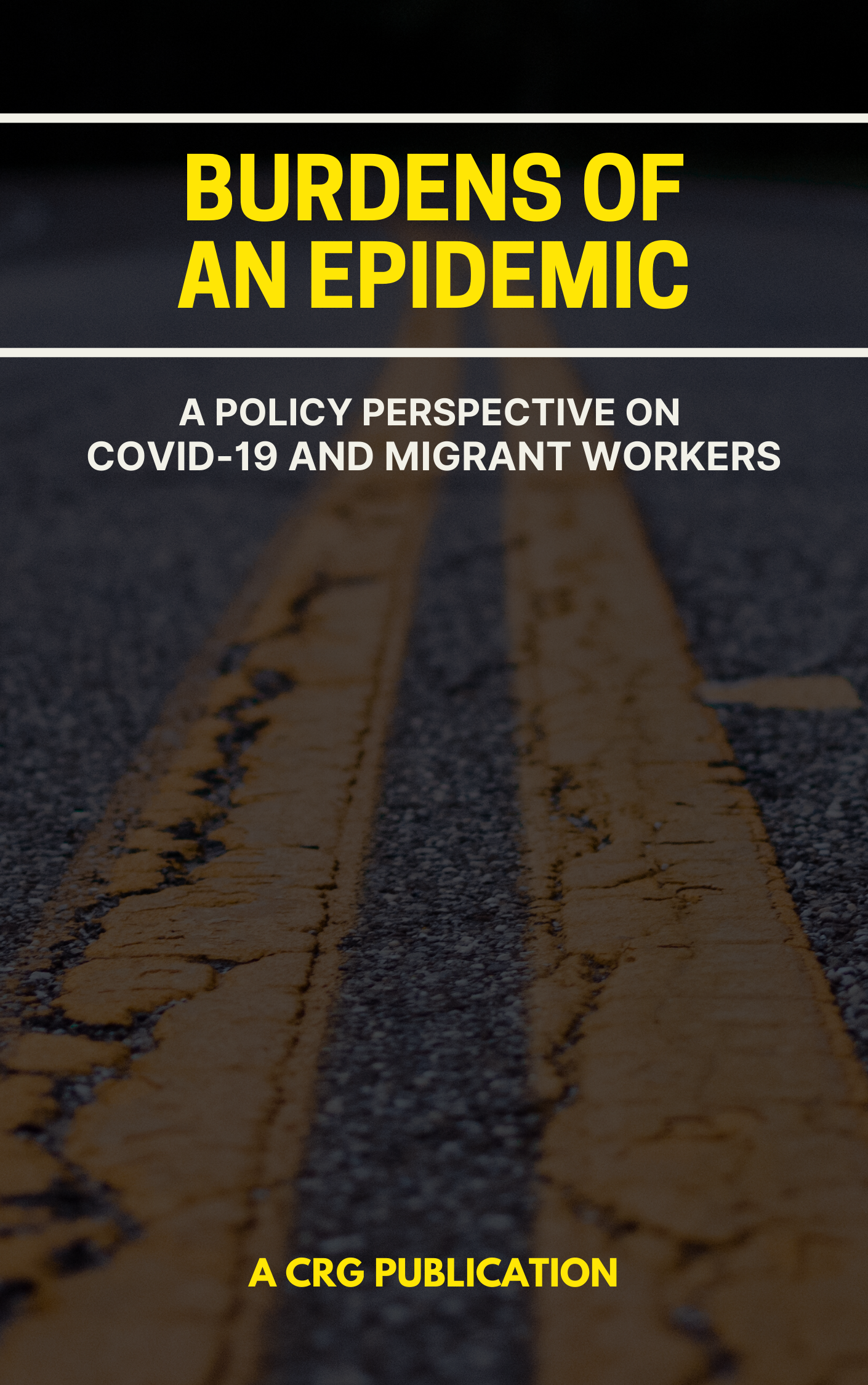 |
|
|
|
|
|
Borders of an Epidemic : COVID 19 and Migrant Workers
Migrant workers from different parts of India trekked back hundreds of kilometres carrying their scanty belongings and dragging their hungry and thirsty children in the scorching heat of the plains of India to reach home in the wake of the sudden announcement by the government of a complete lockdown of the country amid the spectre of Corona virus. Yet while scenes of migrant workers walking in long processions caught the attention of the journalists, it still requires to be asked: What lay behind these long marches? How do caste, race, gender, and other fault lines operate in governmental strategies to cope with a virus epidemic? If the fight against an epidemic has been compared with a war, what are the forces of power at play in this war against the pandemic? What indeed explains the sudden visibility of the migrant workers in the time of a public health crisis? What measures could have been taken and need to be taken now? This online publication by Calcutta Research Group highlights the ethical and political implications of the epidemic – particularly for India’s migrant workers. This book is written as the crisis unfolds with no end in sight.
To procure the
book,
Please contact Calcutta Research Group / Edited by Ranabir Samaddar |
|
 |
|
|
|
|
|
Situating Social Media: Gender, Caste, Protest, Solidarity
Social media produces numerous spaces and opportunities, globally, for people to link up, reach out, mobilise, assert their identity, build bridges... For those on the margins, this virtual alternative enables them to break down otherwise impenetrable social barriers and form close-knit digifams.
Is social media, then, a credible space for building social movements? Who is using it to register dissent, affect change? How successful have such movements been in taking over the digital public sphere? Are the prejudices that exist offline, present online as well? What is the political fallout of multidirectional conversations on the Internet? What about the backlash from trolls and gatekeepers?
Situating Social Media: Gender, Caste, Protest, Solidarity enquires into the possibilities and actual practices of activism and solidarity-building on social media, across the tropes of gender, caste, class, religion, political ideology and disaster. Its wide-ranging essays examine the reportage of incidents and issues by a path-breaking YouTube channel like Dalit Camera; analyse different movements that not only trended online but also thrived on the streets like #MeToo, Pink Chaddi and Gay for a Day campaigns; unpack the Help Uttarakhand mobilisation for climate disaster victims; and attempt a theory of what makes the digital public click.
To procure the
book, please contact Women Unlimited which has
published it / Edited by Samata Biswas & Atig Ghosh |
|
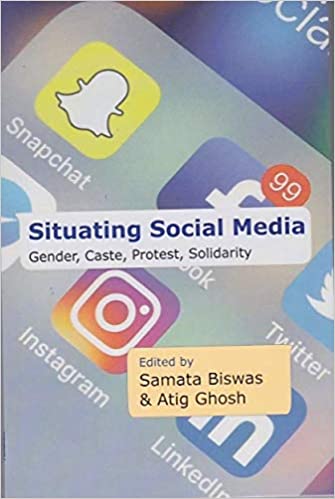 |
|
|
|
|
|
Populism and Populist Politics in South Asia with Special
Reference to India -Hindi Publication
"In an era when Populism is the ‘Mantra’ of the global political order, leaders of many countries are seen to be riding on the Populist waves, be that right-wing or left-wing. Donald Trump in the USA, Jair Bolsonaro in Brazil, Recep Tayyip Erdogan in Turkey, Victor Orban in Hungary, Jeremy Corbyn in the UK, Marine Le Pen in France are some of the names that create populist waves of the day. In the past also, we have seen the rise of Juan Domingo Peron in Argentina, Hugo Chavez in Venezuela and some other leaders came to power riding on populist waves. India and South Asia have also witnessed the rise of populist trends in the not so recent past when Indira Gandhi, Zulfikar Ali Bhutto and Maulana Bhasani took the populist turn in their respective countries in the decade of 1970s. Today, the rise of AAP in Delhi can be traced back to the trend set by MGR-Jayalalitha in Tamil Nadu and N T Rama Rao in Andhra Pradesh. Even the politics of Mamata Banerjee in West Bengal today can be understood better and seen through the optics of Populism.
To understand the manifestations and its implications of Populist Politics in today’s life it is imperative to examine how the populist leaders articulate their politics in catchy phrases and mobilise popular support around them. With that in mind, CRG has published a book on Populism in
Hindi recently. The book deals with both the theoretical concept of Populism as being understood globally and how it manifests somewhat differently in India. There are eight papers by scholars and other researchers that examine various aspects of it. A brief introduction by Prof. Anju Sharan Upadhyay has tried to set the concept of the book on tracks. Perhaps it is the first of its kind in the
Hindi Language so far.
To procure the
book, please contact Calcutta Research Group which has
published it / Edited by Anju Sharan Upadhyay and
Translated by Dr. Prasant Kumar |
|
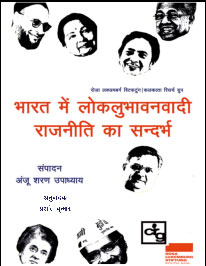 |
|
|
|
|
|
Global Governance and India’s North-East : Logistics,
Infrastructure & Society
This book maps the convergence of governance and connectivity with Asia established through the spatial dynamic s of trade, capital, conflict, borders and mobility. It situates Indian trade and governance policies within a broader Asian and global context.
Focussing on India’s North-East, in particular on India’s Look and Act East Policy, the volume underscores how logistical governance in the region can bring economic and political transformations. It explores the projected development of the North-East into a gateway of transformative cultural interaction among people, just as the Silk Road became a conduit for Buddhism to travel along with musical instruments and tea.
Comprehensive and topical, this book will be useful for scholars and researchers of political studies, international relations, governance studies, development studies, international trade and economics and for think tanks working on South and Southeast Asia.
To procure the
book, please contact Routledge which has
published it / Edited by Ranabir Samaddar and Anita
Sengupta |
|
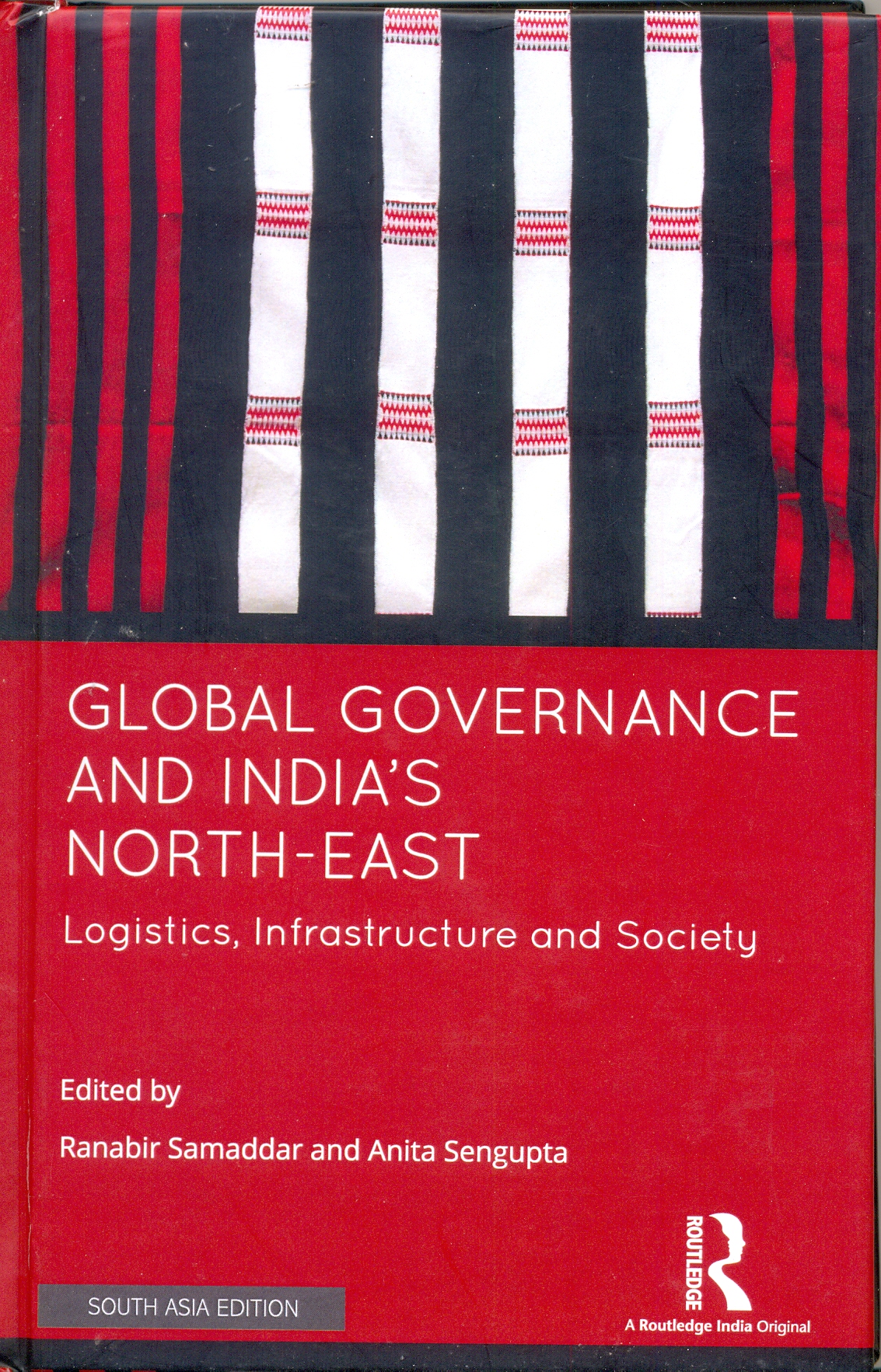 |
|
|
|
|
|
From Popular Movements to Rebellion: The Naxalite Decade
From Popular Movements to Rebellion: The Naxalite Decade argues that without an understanding of the popular sources of the rebellion of that time, the age of the Naxalite revolt will remain beyond our understanding. Many of the chapters of the book bring out for the first time unknown peasant heroes and heroines of that era, analyses the nature of the urban revolt, and shows how the urban revolt of that time anticipated street protests and occupy movements that were to shake the world forty-fifty years later.
This a moving and poignant book. Some of the essays are deeply reflective about why the movement failed and was at the end alienated. Ranabir Samaddar says that, the Naxalite Movement has been denied a history.
The book also carries six powerful short stories written during the Naxalite Decade and which are palpably true to life of the times. The book has some rare photographs and ends with newspaper clippings from the period.
As a study of rebellious politics in post-Independent India, this volue with its focus on West Bengal and Bihar will stand out as an exceptional history of contemporary times.
From Popular Movements to Rebellion: The Naxalite Decade will be of enormous relevance to students and scholars of history, politics, sociology and culture, and journalists and political and social activists at large.
To procure the
book, please contact Social Science Press which has
published it / Edited by Ranabir Samaddar |
|
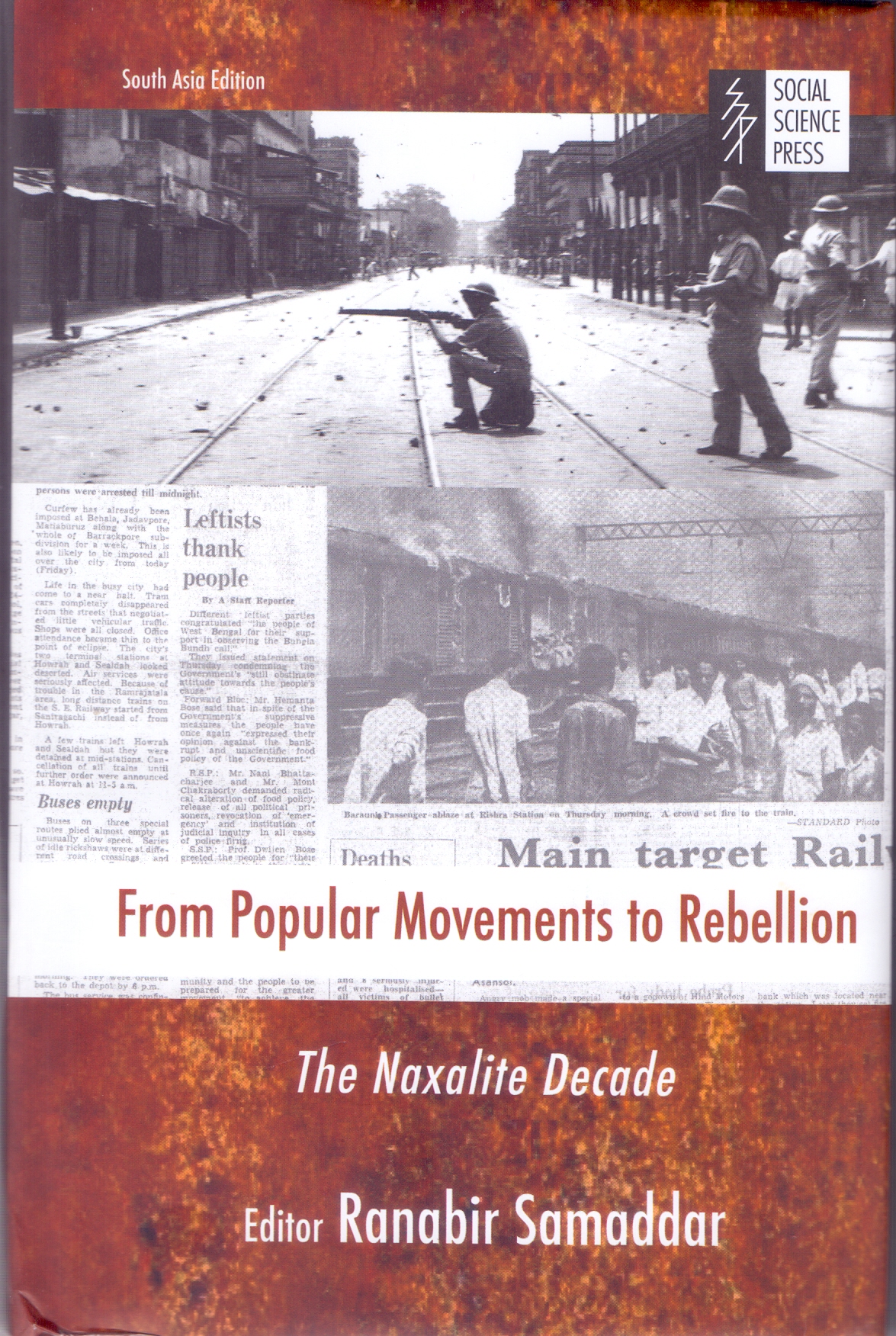 |
|
|
|
|
|
Capital in the East : Reflections on Marx
This book pursues a Marxist approach with an emphasis on class to r4eflect on Marx’s Capital in the context of the East. It critically reassesses some of the familiar concepts in Capital and teases out issues that are at its periphery. In various essays, it explores this borderland to promote new concepts and modes of analysing Marx’s treatise in the twenty-first century. Accordingly, it represents an advance in Marxian theory and politics.
Examining Marx’s Capital from the perspective and location of the East, the book focuses on many issues that are at the ‘borders’ of Capital, which is concerned principally on unpacking developed capitalism. New concepts are introduced and set in relation to those championed by Marx in order to advance our understanding of economy, capitalism, development and politics. In this regard, the book offers a reading of Capital that is distinct from conventional reflections on it in the Western world.
The scope is vast, covering much of the territory in Marx’s Capital, as well as addressing a few new issue connected to Capital. The content is divided into the following sections: Reception of Capital in the East; Value, Commodity, Surplus Value and Capitalism; Population and Rent in Capital; and Issues Beyond Capital.
To procure the
book, please contact Springer which has
published it / Edited by
Achin
Chakraborty, Anjan Chakraborti, Byasdeb Dasgupta & Samita
Sen |
|
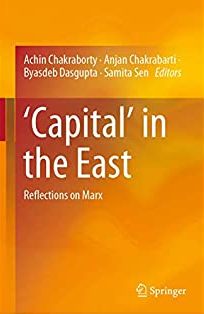 |
|
|
|
|
|
The Rohingya In South Asia
The Rohingya of Myanmar are one of the world’s most persecuted minority populations without citizenship. After the latest exodus from Myanmar in 2017, there are now more than half a million Rohingya in Bangladesh living in camps, often in conditions of abject poverty, malnutrition and without proper access to shelter of work permits. Some of them are now compelled to take to the seas in perilous journeys to the Southeast Asian countries in search of a better life. They are now asked to go back to Myanmar, but without any promise of citizenship or an end to discrimination.
This book looks at the Rohingya in the South Asian region, primarily India and Bangladesh. It explores the broader picture of the historical and political dimensions of the Rohingya crisis, and examines subjects of statelessness, human rights and humanitarian protection of these victims of forced migration. Further, it chronicles the actual process of emergence of a stateless community-the transformation of a national group into a stateless existence without basic rights.
This volume will be of great interest to students and researchers of human rights, migration and Diaspora studies, race and ethnic studies, refugee studies, politics and international relations, discrimination studies, and peace and conflict studies, as well as to international organization, those in law, media and journalism, civil society and policymakers.
To procure the
book, please contact Routledge which has published it
/ Edited by Sabyasachi Basu Ray Chaudhury & Ranabir Samaddar |
|
 |
|
|
|
|
|
Political Ecology of Survival
The world over, resource extraction and an extractive mode of economy have impacted various population groups, and consequent conflicts over natural resources have damaged earlier modes of resource sharing. The river lands are one such resourceful space where conflicts relating to the development discourse are played out. These once economically-viable lands have become sites of unplanned growth, rampant commercialisation, administrative apathy and the politics of resource extraction.
Drawing on intensive field studies and research, Political Ecology of Survival studies how people living along the river banks, and ‘with the rivers’, of Bihar, deltaic Bengal and the North-East negotiate nature on the one hand, and the economy, politics and administration on the other in this milieu. It presents a close look at a landscape that is the battleground of environment, economy and politics, and offers a fresh look at how best to preserve river systems so as to continue with the life and livelihood of humankind.
The communities studies here, heavily dependent on natural resources and hailing from the lowest rungs of society, are forced to negotiate environmental and developmental challenges and related displacements and migration. The essays explore, among others, the problem of floods and erosion in the Brahmaputra valley; resource crises, resource sharing and large scale displacements of population groups in deltaic Bengal; and the pressing problem of migration around Barak river in the North-East.
This unique collection will interest students and scholars of migration studies, environmental studies, political science and anthropology. It will also be invaluable for development activists, journalists, policymakers and NGOs working in the field.
To procure the
book, please contact Orient Black Swan which has published
it / Edited by Madhurilata Basu, Rajat Roy, & Ranabir Samaddar |
|
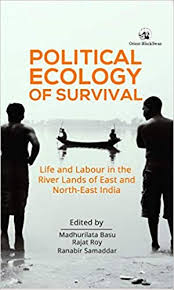 |
|
|
|
|
|
Migrants and The Neoliberal City
India nurtures a contradiction between two images of its cities-they are the engines of economic growth and at the same time an inadequeate and contested space for its various residents and subjects Migrants and the Neoliberal City a culmination of the research conducted by the Calcutta Research Group on rural migrants as the core of the urban poor in India, shows us why and how this contradiction plays out in the lives of migrants, on whose labour the city thrives.
This collection of twelve essays, based on extensive research and fieldwork, investigates the experience of migrating to three of India’s populous metropolitan cities: Kolkata, Mumbai and Delhi. They focus on the interrelations between urban policy, governance, forms of labour, migration, and neoliberalism as the political ideology motivating increasing urbanisation of India. It also shows how cities are increasingly turning into sites of conflict, fragmentation and gentrification, fragmentation and acute class conflict.
Since the migrant is central to neoliberal urban development and migrant labour is critical to the transformation of the city, their position in the informal, unorganised sector and their vulnerability to violence makes migrant labour and life precarious. This book documents and examines the coping strategies of such migrants, new forms of urban struggles, and resistances to legal and policy regimes. Focusing on the connections between the material conditions of labour and specific issues such as old age, rent, wage forms, etc., this book also shows how the recruitment and dispersal of this migrant labour in turn restructures urban spaces.
An important addition to the growing literature on Indian urbanism and urbanisation, this book will interest policy analysts and students and scholars of sociology, migration studies, development studies, urban studies and geography.
To procure the
book, please contact Orient Black Swan which has published
it / Edited by Ranabir Samaddar |
|
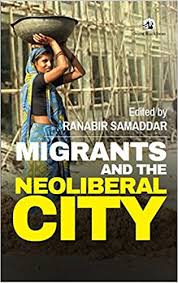 |
|
|
|
|
|
Karl Marx and The Postcolonial Age
This book seeks to explicitly engage Marxist and post-colonial theory to place Marxism in the context of the post-colonial age. Those who study Marx, particularly in the West, often lack an understanding of post-colonial realities, conversely, however, those who fashion post-colonial theory often have an inadequate understanding of Marx. Many think that Marx is not relevant to critique postcolonial realities and the legacy of Marx seldom reaches the post-colonial countries directly. This work will read Marx in the contemporary post-colonial condition and elaborate the current dynamics of post-colonial capitalism. It does this by analysing contemporary post-colonial history and politics in the framework of inter-relations between the three categories of class, people, and postcolonial transformation. Examining the structure of power in postcolonial countries and revisiting the revolutionary theory of dual power in that context, it appreciates and explains the transformative potentialities of Marx in relation to post-colonial condition.
To procure the
book, please contact Palgrave Macmillan which has published
it / Authored by Ranabir Samaddar |
|
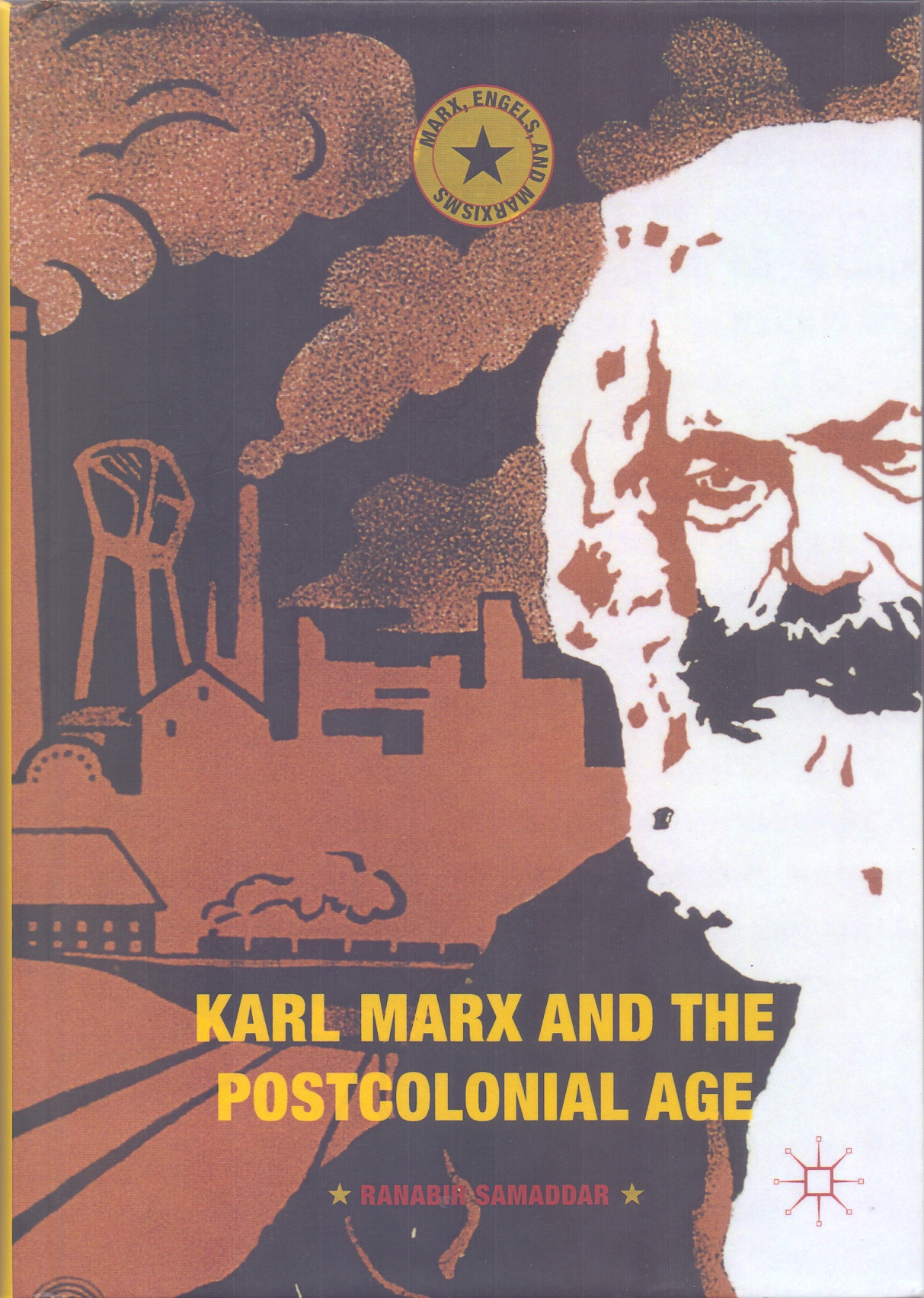 |
|
|
|
|
|
Accumulation in Post-Colonial Capitalism
The volume looks at how accumulation in postcolonial capitalism blurs the boundaries of space, institutions, forms, financial regimes, labour processes, and economic segments on one hand, and creates zones and corridors on the other. It draws our attention to the peculiar but structurally necessary coexistence of both primitive and virtual modes of accumulation in the postcolony. From these two major inquiries it develops a new understanding of postcolonial capitalism. The case studies in this volume discuss the production of urban spaces of capital extraction, institutionalization of postcolonial finance capital, gendering of work forms, establishment of new forms of labour, formation of and changes in caste and racial identities and networks, and securitization – and thereby confirm that no study of contemporary capitalism is complete without thoroughly addressing the postcolonial condition.
By challenging the established dualities between citizenship-based civil society and welfare-based political society, exploring critically the question of colonial and postcolonial difference, and foregrounding the material processes of accumulation against the culturalism of postcolonial studies, this volume redefines postcolonial studies in South Asia and beyond. It is invaluable reading for students and scholars of South Asian studies, sociology, cultural nd critical anthropology, critical and praxis studies, and political sciences.
To procure the
book, please contact Springer which has published it /
Edited by Iamn Kumar Mitra, Ranabir Samaddar & Samita
Sen |
|
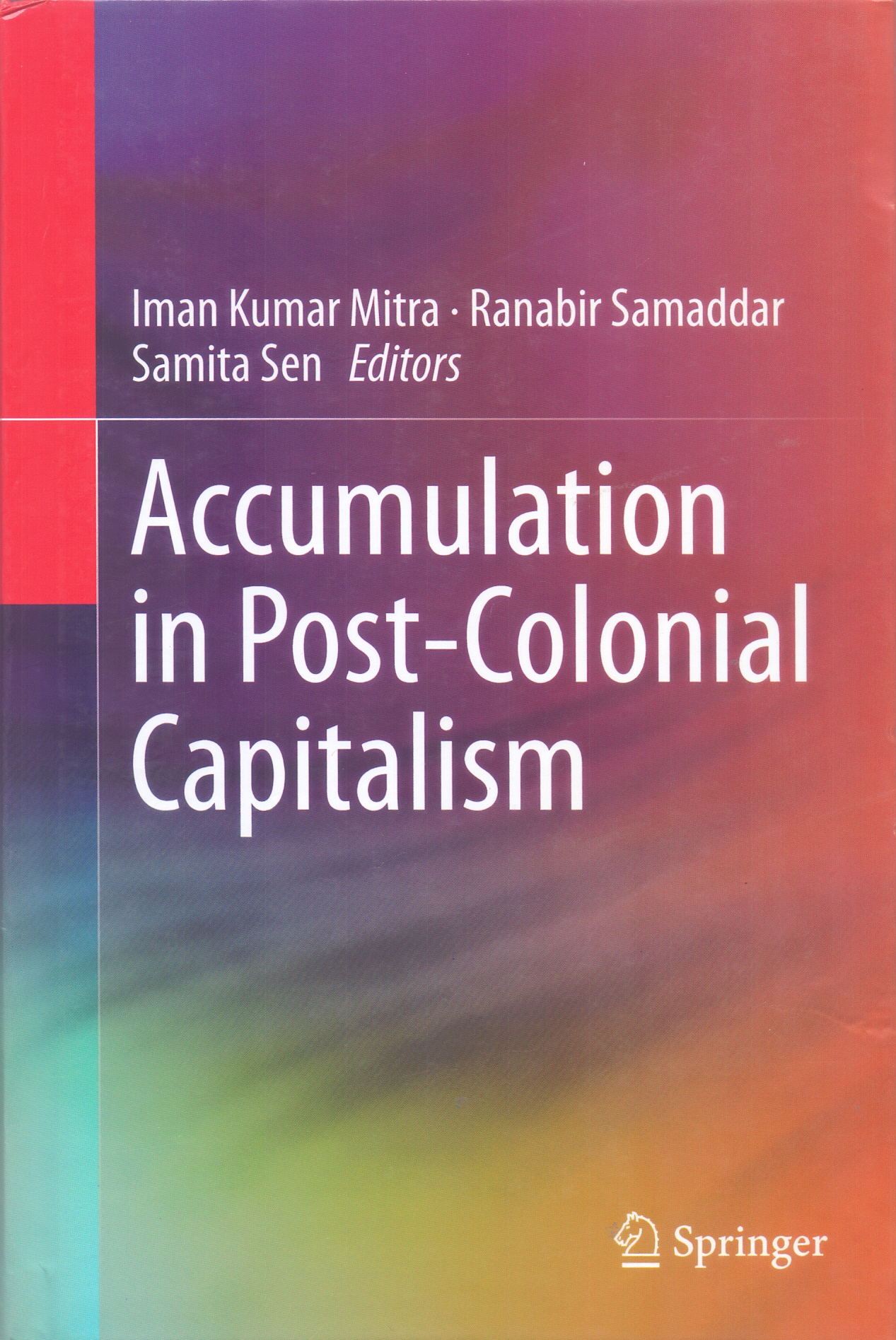 |
|
|
|
|
|
The Crisis of 1974: Railway Strike and the Rank and File
This book on the Indian Railway Strike of 1974 looks at the history of the time, the role of the rank and file in the strike, and the fate of the strike itself. Even as one of the most distinctive aspects of the strike was the autonomy of the rank and file, the significance of the struggle had much to do with the nature of the time. The country was in the midst of a general political crisis, sections of the peasantry were in revolt, and there were expressions of the solidarity from the industrial working class. However, the strike leadership was not resolute and decisive, and failed the rank and file. In the absence of a political vanguard, the uprising was left without a determined subject.
The railwaymen did not transform India, but established for the first time in the political history of post-independent India the autonomy of the political practice of masses. Suddenly, the strike had opened up a vision whose infinite nature unnerved both the part of order and the parties of constitutional opposition.
To procure the
book, please contact Primus Books which has published it
/ Authored by Ranabir Samaddar |
|
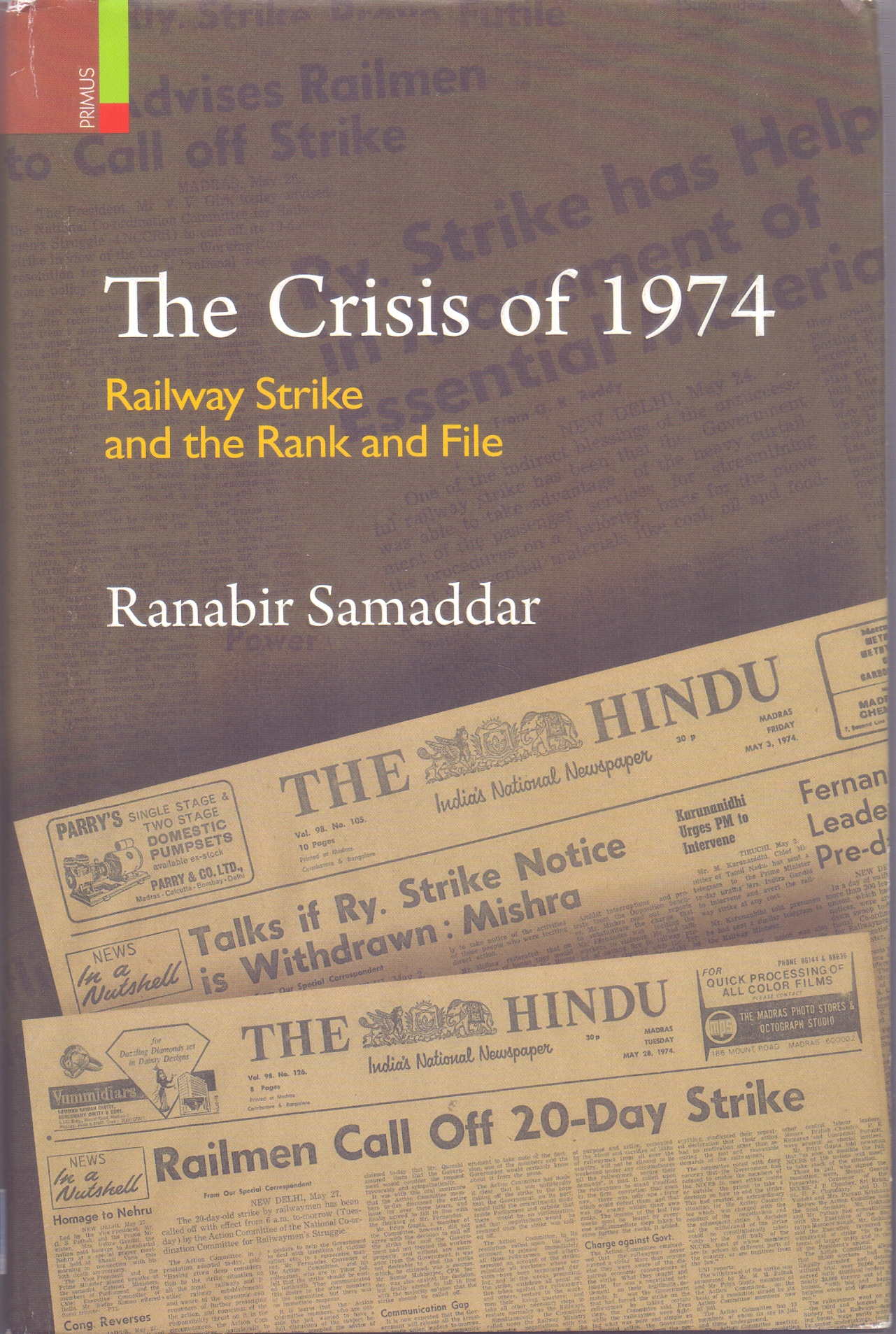 |
|
|
|
|
|
A Post-Colonial Enquiry into Europe's Debt and Migration
Crisis
This important and topical volume is composed around the debt and migration crisis in Europe in 2015 (known as the Greece crisis), and written almost concurrently as the two crises developed in quick succession. The central argument here is that Europe’s present crisis suggests a post-colonial bind, or to put in stronger terms, a post-colonial destiny of Europe. The European situation bears remarkable similarity with the post-colonial condition elsewhere in the wor4ld and suggests a strong bond between Europe’s present situation and the post-colonial bind in which much of the world finds itself. The purpose of this volume is to examine in the list of 21st century capitalism notions such as debt, crisis, rupture, dialogue, mobilization, neo-liberalism, war and migration, and the old, never to be settled, question of ideology. The volume ends with reflections on Europe’s migration crisis, and reinforces the point that a critical post-colonial sense of history, accumulation, globalization, and the resilience of the nation form will help un reflect on the present European crisis, and draw appropriate lessons.
To procure the
book, please contact Springer which has published it /
Authored by Ranabir Samaddar |
|
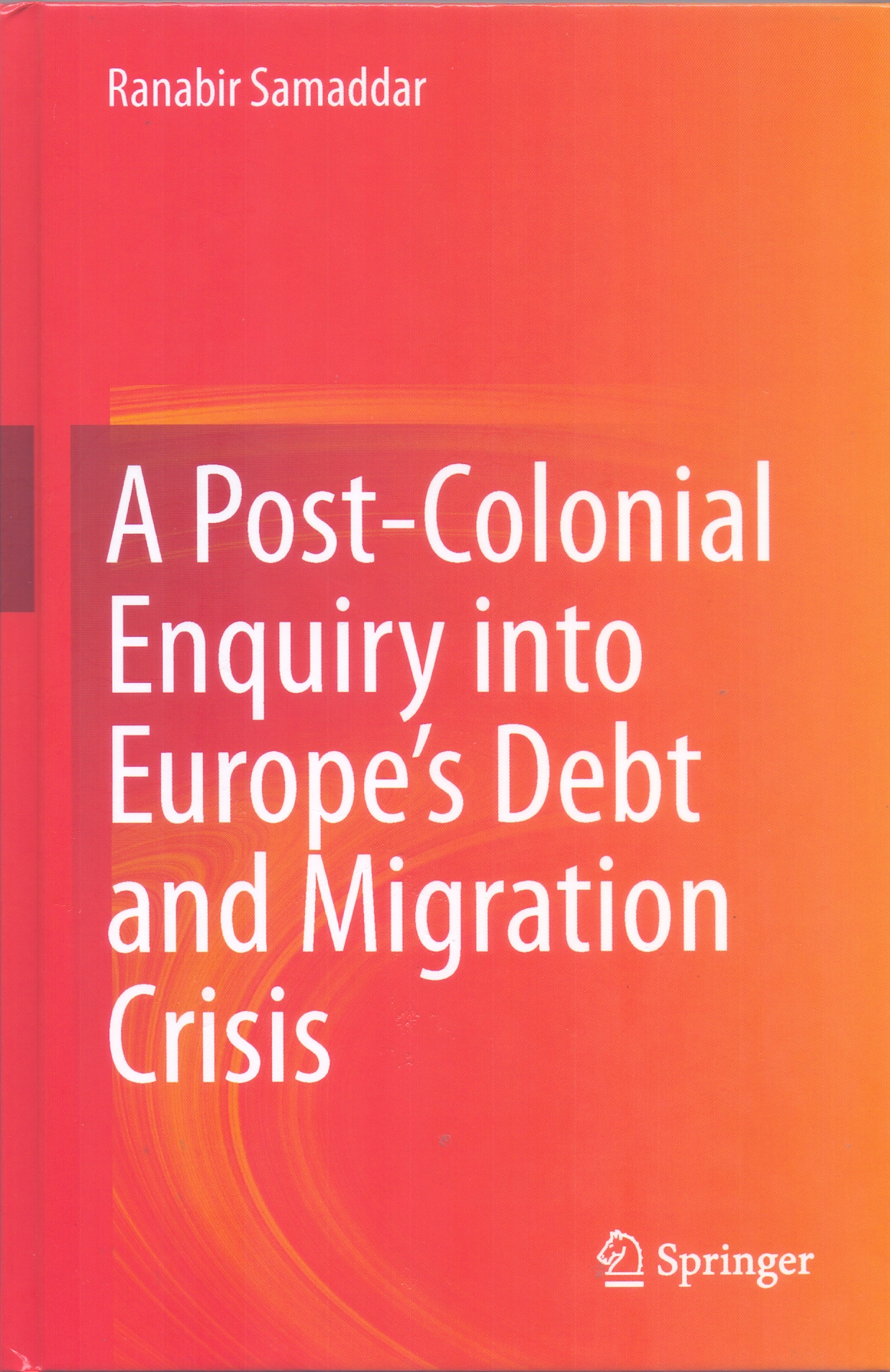 |
|
|
|
|
|
The Biopolitics of Development: Reading Michel Foucault
in the Postcolonial Present
This book offers an original analytic and theorization of the biopolitics of development in the postcolonial present, and draws significantly from the later works of Michel Foucault on biopolitics. Foucault’s works have had a massive influence on postcolonial literature, particularly in political science and international relations, and several authors of this book have themselves made significant contributions to that influence.
While Foucault’s thought has been inspirational for understanding colonial biopolitics as well as governmental rationalities concerned with development, his works have too often failed to inspire studies of political subjectivity. Instead, they have been used to stoke the myth of the inevitability of the decline of collective political subjects, often describing an increasingly limited horizon of political possibilities, and provoking a disenchantment with the political itself in postcolonial works and studies.
Working against the grain of current Foucauldian scholarship, this book underlines the importance of Foucault’s work for the capacity to recognize how the degraded view of political subjectivity came about, particularly within the framework of the discourse and politics of ‘development’, and with particular attention to the predicaments of postcolonial peoples. It explores how we can use Foucault’s ideas to recover the vital capacity to think and act politically at a time when fundamentally human capacities to think, know and to act purposively in the world are being pathologized as expression of the hubris and ‘underdevelopment’ of postcolonial peoples. Why and how it is that life in postcolonial settings has been depoliticized to such dramatic effect? The immediacy of these themes will be obvious to anyone living in the South of the world. But within the academy they remain heavily under-addressed. In thinking about what it means to read Michel Foucault today, this book tackles some significant questions and problems. Not simply that of how to explain the way in which postcolonial regimes of governance have achiv4ed the debasements of political subjectivity they have; nor that of how we might better equip them with the means to suborn the life of postcolonial peoples more fully; but that of how such peoples, in their subjection to governance, can and do resist, subvert, escape and defy the imposition of modes of governance which seek to remove their lives of those very capacities for resistance, subversion, flight, and defiance.
To procure the
book, please contact Springer which has published it /
Edited by Sandro Mezzadra, Julian Reid & Ranabir Samaddar |
|
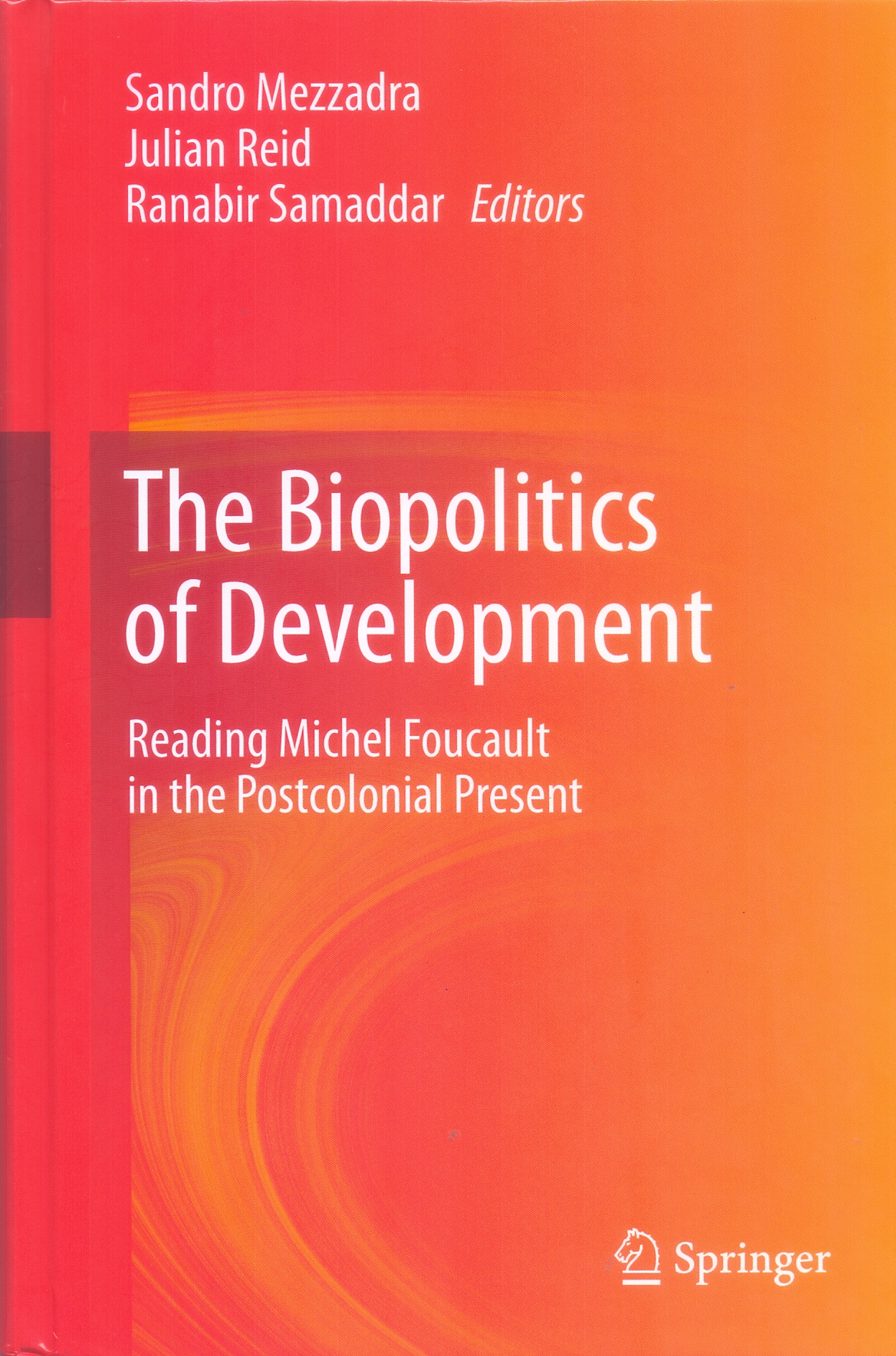 |
|
|
|
|
|
The Borders of Justice
The Borders of Justice interrogates the concept and practices of justice in original and provocative ways, combining the geographical diversity of the authors with a variety of disciplinary and methodological approaches. The essays reveal how justice appears differently in different places and from different perspectives. This is an important contribution to contemporary debates on justice”. ¬– Michael Hardt, Professor of Literature at Duke University and co-author (with Antonio Negri) of
Multitude: War and Democracy in the Age of Empire, and Commonwealth.
The Borders of Justice investigates the complexities of transitional justice that emerge from its “social embeddedness.” This original collection of essays, which stem from a collective research program on social justice undertaken by the Calcutta Research Group, confronts the concept and practices of justice. The editors and contributors question the relationship between geography, methodology, and justice-how and why justice is meted out differently in different place. Expanding on Michael Walzer’s idea of the “spheres of justice,” the contributors argue that justice is burdened the our notions of social realities and expectations, in addition to the influence of money, law, and government.
To procure the
book, please contact Temple University Pree which has published it /
Edited by Etienne Balibar, Sandro Mezzadra, & Ranabir Samaddar |
|
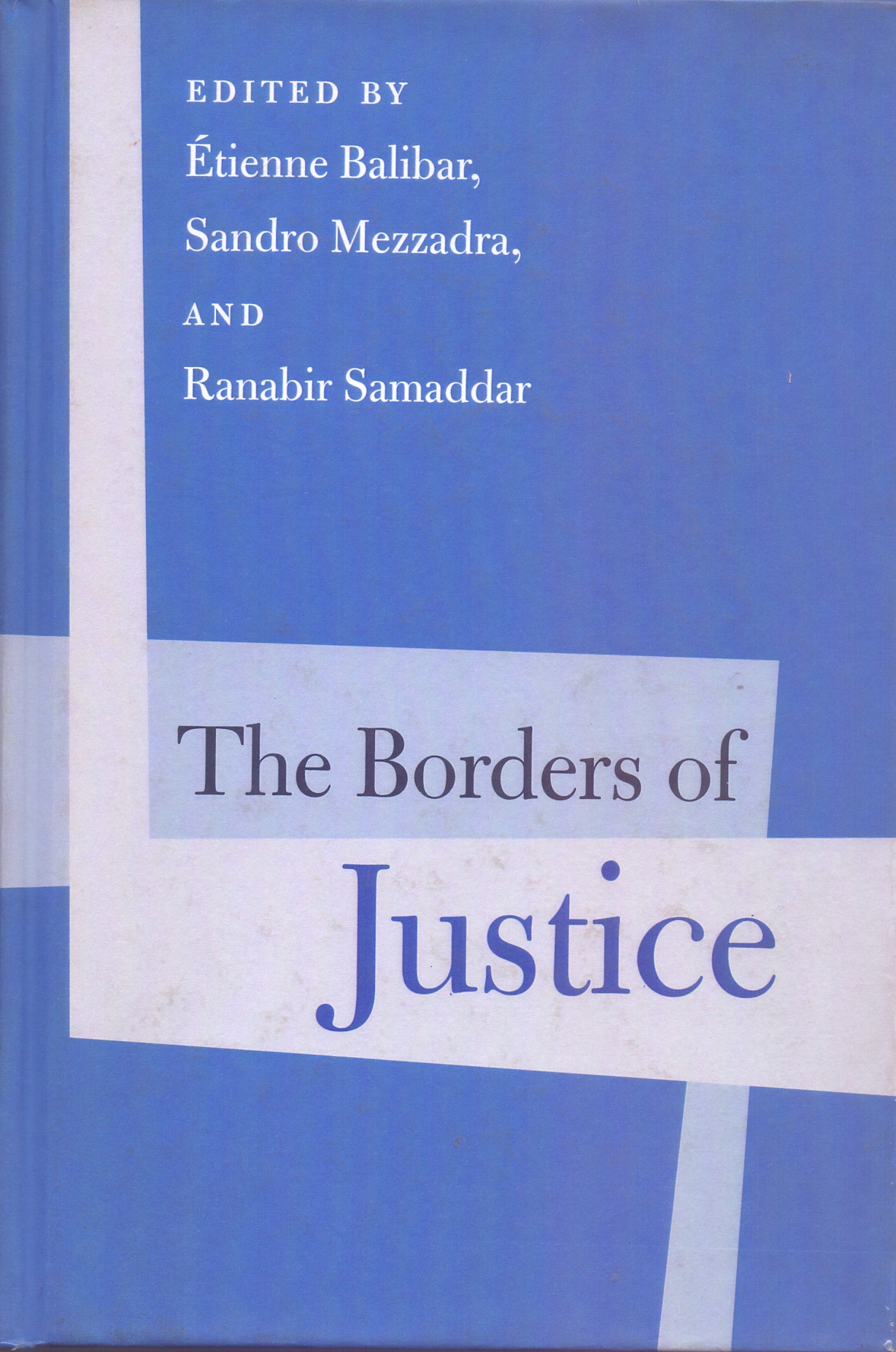 |
|
|
|
|
|
Government of Peace: Social Governance, Security and the
Problematic of Peace
Government of Peace addresses a major question in world
politics today: how does post-colonial democracy produce a
form of governance that copes with conflicts, insurgencies,
revolts, and acute dissents? The contributors view social
governance as a crucial component in answering this question
and their narratives of governance aim to show how certain
appropriate governing modes make social conflicts more
manageable or at least also occasions for development. They
show how government often expands to cope with acute
conflicts; money is made more readily available; the
transfer of resources acquires frantic pace; and so society
becomes more attuned to a money-centric, modern life. Yet
this style of governance is not the only approach. Dialogues
from below challenge this accepted path to peace building
and new subjectivities emerge from movements for social
justice by women, migrants, farmers, dalits, low-caste, and
other subaltern groups. The idea of a government of peace
sits at the core of the interlinked issues of social
governance, peace-building, and security. By exploring this
idea and analysing the Indian experience of insurgencies and
internal conflicts the contributors collectively show how
rules of social governance can and have evolved.
To procure the
book, please contact Ashgate which has published it /
Edited by Ranabir Samaddar |
|
 |
|
|
|
|
|
Forced Migration & Media-Mirrors
Forced migration is
increasingly becoming a threat to peace and stability of
people’s lives in many parts of the world. India is no
exception to the trend. The fury of nature as well as the
violence of human conflicts causes populations to be on the
run, and seldom do they find solace in their new settlement.
How do the media reflect this
phenomenon? Are they sensitive enough to the multiple
dimensions of this great human tragedy – its impact on
people’s rights, ethnic relations, gender justice, etc.? Do
biases creep in during their coverage? Are the voices of the
dispossessed heard? How can the latter set up alternative
channels to disseminate their own news and views? Do new
media provide more possibilities in this regard?
Forced Migration & Media
Mirrors looks
at the relationship between media and forced migration from
all these aspects and more in the context of the Indian
subcontinent. While bringing the North-East and Himalayan
West Bengal in special focus, it also contains in-depth
studies on Gujarat and Karnataka. Along with the empirical
studies, theoretical questions are amply discussed in the
section ‘Interrogating the Media’. A number of photo-essays
enhance its richness and variety.
The authors include both accomplished academics and ace
journalists who have been studying the phenomenon of forced
migration for a long time in their own ways. In this
respect, the book is an attempt to bridge the media-academia
divide.
To procure the book, please
contact frontpage which has published it / Edited by Sibaji
Pratim Basu |
|
 |
|
|
|
|
|
Sanghat
O Sashan [Conflict
and Governance]
It is a
a result of collaborative reserach undertaken by various
researchers under project entitled "The role of Governance
in the Resolution of Socioeconomic and Political Conflict in
India and Europe" (CORE). It is funded by the Socio-economic
and Humanities in the European Community's Seventh Framework
Programme (FP7/2007-2013) under grant agreement no. 266931.
To procure the book, please
contact Gangchil
publication: Kolkata which
has published it / Edited by Anasua
Basu Roychoudhury |
|
 |
|
|
|
|
|
Beyond Kolkata : Rajarhat and
the Dystopia of Urban Imagination
This book examines the politics behind, and the
socio-economic and ecological repercussions of, the making
of a new township, variously called New Town, Megacity or
Jyoti Basu Nagar, in Rajarhat near Kolkata. Conceived by the
West Bengal state government in the mid-1990s, in pandering
to the vision of urban planners of creating a hi-tech town beyond an
unruly, crowded Kolkata, and feeding the hunger of realtors
and developers, the city is built on the foundations of
coercive, even violent, land acquisition, state largesse and
corruption — and at the cost of erasing a self-sufficient
subsistence economy and despoiling a fragile environment.
Yet, after its completion and departure of construction
labour, the new town appears as a necropolis, a ghost city,
that belies its promised image of an urban utopia, even as
the displaced locals lead a precarious, mobile existence as
‘transit labour’, engaged in odd and informal jobs.
Written on the
basis of intensive fieldwork, government documents, court
records, and chronicles of public protests, this book
broadly analyses the politics and economics of urbanisation
in the age of post-colonial capitalism, particularly the
paradoxical combination of neoliberal and primitive modes of
capital accumulation upon which the global emergence of ‘new
towns’ is based.
Departing from the dominant styles of urban studies that
focus on cultural or spatial analysis of cities, the authors
show the links between changes in space, technology,
political economy, class composition, and forms of urban
politics which give concrete shape to a city. It will
immensely interest those in sociology, political science,
economics, development studies, urban studies, policy and
governance studies, and history.
To procure the book, please
contact Routledge which has published it / Authored by
Ishita Dey, Ranabir Samaddar & Suhit K.Sen |
|
 |
|
|
|
|
|
Passive Revolution in West
Bengal: 1977-2011
In the wake of the enormous interest across the globe in the
fall of the Left Front in West Bengal, this book describes
the Left era as one of passive revolution: limited reforms
and changes, big compromises, corruption of the commissars
and the failure of the Left in assessing popular discount
and anger; thus, it is the end of revolution even in passive
form.
A collection of
articles by Samaddar from leading national dailies and
journals between 1977 and the downfall of the Left in West
Bengal, this book analyses the era of the Left rule, its
political decisions viability. Samaddar argues that the
Left’s rule and its own governmental style destroyed the
hegemony it had built up through assiduous work of decades.
A Commentary on
contemporary history and an assessment of it, this work
helps the reader understand better, the re-emergence of the
Maoist movement in West Bengal, the governmental techniques
of the Left and dynamics of popular politics.
The evening of
13 May 2011: The setting sun was never so ‘red’ in West
Bengal.
From ‘red’ to
‘green’, a change in regime ushered in. But what happened in
West Bengal on that day came in with a sense of déjà vu, a
recall of Bengal 1977. The people wanted change then and the
Left provided that. Something of that nature happened again
in 2011.With the widespread misrule and violence marking the
last phase of the Left Front rule, people massively voted
for regime change. As the author says: ‘Passive democracy is
democracy as practiced by the people in an epoch of passive
revolution.’ This book narrates the story of the people, the
society, the transition and thus traverses the whole course
of passive revolution.
This
compilation is at once a history and a diary, a book and a
journal- a kind of political journalism, engaged with
questioning the truths of the day. For years to come, the
story of this transition will remain an important lesson in
popular politics and governance.
To procure the
book, please contact Sage which has published it / Authored
by Ranabir Samaddar |
|
 |
|
|
|
|
|
Branding The Migrant: Arguments
of Rights, Welfare and Security
This book deals
with the Unique Identification (DID)/ Aadhaar project which
has burst
upon the nation with surprising ferocity. The government has
started implementing
Aadhaar enabled direct cash transfers for 29 schemes in 51
districts, spread over 16 states and also plans to cover the
entire nation by the
end of December 2013. Yet, it is far from clear if Aadhaar
is an undisruptive
benevolent initiative of the government, seeking to empower the
needy and maximise the outreach of social-security schemes.
Legal experts,
scholars and activists have discussed and deliberated on
the Aadhaar scheme and the governmental logic
underlying it. However, the torrential
commentary against the DID scheme notwithstanding, the Aadhaar
juggernaut is forging ahead.
Against this backdrop, this volume endeavours to engage with
the politics and history of the state's population
identification exercises. In doing so, it goes
beyond the specifics of the UID project to situate the issue
in the broader
context of identification technologies sponsored by the
state and the
market over time. Given the fact that there are writings on
the UID project
and its impact on the resident population but nothing on its
impact on
migrant population groups, this volume chooses to focus on
the impact of
the UID and similar identification technologies on migrants.
The migrants
may be a minority compared to the residents but, as
individuals who remain mostly beyond the embrace of the
state, they represent a limit on
its penetration; they also remain at the metaphorical
margins of the state's
will to encompass all. This volume, therefore, aspires to
test the idea and
impact of the UID at its limits — focusing on its impact on
migrants — and
interrogate if the reach of the state can after all exceed
its grasp.
The significance of the volume is in the diverse range of
reports and opinions
it presents. Bringing together case studies across the
length andbreadth
of India as well as theoretical engagements with the theme,
the book
urges the reader to think if the implementation of the UID
project would
after all only faithfully serve age-old statist imperatives
of identifying, de-legitimising
and expelling migrants from ‘national’ territory; whether the
language of welfare of the UID project masks an anxiety for
security, in this
case the securitisation of an entire nation.
To procure the
book, please contact frontpage which has published it /
Edited by Atig Ghosh |
|
 |
|
|
|
|
|
Unstable Populations, Anxious
States: Mixed and Massive Population Flows in South Asia
‘From its inception,
South Asia has been confronted by massive displacements', so
states the editor, Paula Banerjee, who adds that liberation
was intrinsically attached
to the partition of states, leading
to huge human flows who faced horrific, indescribable
violence. Aside from the refugees are the internally
displace people (idps), largely
belonging to vulnerable sections such as religious and
ethnic minorities,
indigenous people, dalits and the urban poor. Often the displaced
face multiple displacements, and it becomes impossible to
know whether displacement was due to conflict, development
or ecological
conditions.
The complexities of
displacement have created massive, mixed
flows: refugees, asylum-seekers, illegal immigrants, idps, and
other victims of violence, deprivation, hunger. Persecution
and discrimination occur
together, and the old forms of protection are often
inadequate. The United Nations High Commissioner for Refugees (unhcr) responded
with a Ten-Point Plan of Action for Refugee Protection and
Mixed Migration. This was the focus of a two-day
dialogue on 'Protection Strategies in South Asia' organized
by Mahanirban Calcutta
Research Group (mcrg), which
led to this comprehensive collection, compiled by
social scientists, media analysts and
activists.
Divided into three parts, Part I, ‘Conflict-Induced
Situations’, Part II, ‘Issues’, and Part III,
‘Institutions’, this book offers an overview of South Asian
experiences, an analysis of the principles of protection and
their inadequate implementation. It considers the disparitybetween
economic growth and human development indices that leads
to continuous massive human flows: refugees, idps or
economic migrants; ultimately human beings in great
distress.
To procure the
book, please contact Samya which has published it / Edited
by Paula Banerjee |
|
 |
|
|
|
|
|
The Nation Form: Essays on
Indian Nationalism
Most writings on the theme of the nation confine themselves
to discussions of ideology and thoughts on nationalism,
leaving out the question of the form of the nation. This
selection of writings by Ranabir Samaddar fills in that void
and presents a whole range of dimensions, perspectives, and
controversies of the last two decades on the question of the
nation in India. It looks at the form of the India nation in
terms of contests, contradictions, classes, and nationalist
strategies of inclusion and exclusion, thereby addressing
two significant issues in view of the nation form –its
relation with democracy and the problem of governing the
nation. This selection not only comprises essays that stand
on their own merit, but also, in totality, presents a
historical summary of the nation’s experience through
decades-before and after Independence.
It was and
still remains a dispute about how to study the nation, and
therefore the form of the nation. … There is no
transcendental ideal of the nation, and to the extent that
such an ideal is present, it only serves to hide the reality
of the nation form. This book, thus, is not about
nationalism, but about nation.
To procure the
book, please contact Sage which has published it / Authored
by Ranabir Samaddar |
|
 |
|
|
|
|
|
New Subjects and New Governance
in India
This volume explores the ways in which
governance in the exercise of its strategies also acts as a
process of production of subjects. It argues that governance
is not a one-sided affair starting and ending with those who
rule and govern, but a productive process — one that
produces subjects of governance who in turn respond to the
process, and make the field of governance a contentious one.
This volume studies the transition towards developmental
democracy, examining the interrelations between
globalisation, development and structures of governance. It
suggests that while there is need to reflect on the governance
of transition,
it is important to question how democracy negotiates this
transition.
To procure the book, please
contact Routledge which has published it / Edited by
Ranabir Samaddar and Suhit
K.Sen |
|
 |
|
|
|
|
|
Political Transition and
Development Imperatives in India
This volume explores the
transition from colonial to constitutional rule in India,
and the various configurations of power and legitimacies
that emerged from it. It focuses on the developmental
structures and paradigms that provided the circumstances for
this transition, and the establishment of the post-colonial
state. Different articles interrogate the idea of liberal
constitutionalism, the spaces it provides for rights and
claims, the assumptions it makes about citizenship and its
attendant duties, and the assumptions it further makes about
what it can, or has to, become in the particular situation
of India.
The book locates these questions in the reconfiguration of
society, power, and the economy since the shift in the
identity of the state after Independence, and deals with
issues of constitution-making in a historical and political
setting and its outcomes, especially the centrality of law
and legalisms, in shaping civil society. This book
emphasises continuity and change in the context of the
movement from the colonial to the constitutional order.
To procure the book, please
contact Routledge which has published it / Edited by
Ranabir Samaddar and Suhit
K.Sen |
|
 |
|
|
|
|
|
Forced Migration in North East
India: A Media Reader
Forced Migration in North East India: A Media Reader is a
comprehensive ready reference and toolkit for journalists,
researchers, and people in general - who are interested in
the media and North East India.
The region
though geographically isolated and economically
underdeveloped, has a distinctive cultural; socio-economic
and Political identity. Viewed from within, it represents an
incredible diversity comprising over 200 indigenous
communities.
As the states
in North East India have borders with several countries –
China, Myanmar, Bhutan, Nepal and Bangladesh-since
vivisection of the Indian subcontinent in 1947, the region
has faced waves of population influx from across the borders
at various times. Forced migration and displacement due to
repeated ethnic violence have led to hundreds of villages
being burnt and thousands of people killed. The figure of
internality displaced persons in the region has surpassed
the half a million mark according to a recent estimate.
Besides ethnic
conflicts, natural calamites such as floods and erosion, as
well as construction activities or eviction in the reserve
forest areas have added to the misery of the displaced
persons in North East India, many of whom are languishing in
the temporary camps for decades.
However, the
issue often does not get due coverage in the media and many
journalists feel that the resources, tools and skills to
cover this issue at their disposal are inadequate, The Media
Reader is an effort to bridge this gap.
To procure the
book, please contact frontpage which has published it /
Edited by Nilanjan Dutta |
|
 |
|
|
|
|
|
Women In Indian Borderlands
Women in Indian Borderlands is
an ethnographic compilation on the complex interrelationship
between gender and political borders in south Asia. The book
focuses on the border regions of West Bengal, Jammu and
Kashmir And Northeast India.
The Chapters in
the book examine the stories of women whose lives are
interwined with borders, and who resist everyday violence in
all its myriad forms. They show how most of the traditional
efforts to make geopolitical regions mare secure end up
privileging masculine definition of security that only
results in feminine insecurities.
These essays
discuss hoe women negotiate their differences with a state
that, though democratic, denies space to differences based
on ethnicity, religion, class or gender. Borders are
interpreted as ones where the jurisdiction of one state ends
and that of the other begins. What comes out is the
startling revelation that women not only live on the
borders, but also , in many ways, form them.
To procure the
book, please contact Sage which has published it / Edited
by Paula Banerjee and Anasua Basu Ray Chaudhury |
|
 |
|
|
|
|
|
Sustainability of Rights after
Globalisation
Sustainability of Rights after Globalisation is the result
of the Indian Council of Social Science Research (ICSSR) -
supported research programme. ‘Globalisation and
Sustainability of Rights’. The Thrust of this volume is an
various concerns of globalization and its interface with
rights.
The books talks
about the interconnectedness of globalization with social
and economic systems and how links develop with reference to
both polity and common people’s movements. The book provides
a new way of understanding the constitution of rights with
the help micro-histories drawn from diverse fields, such as
environmental rights, law, information, and labour studies
in India.
The book
examines how rights have been redefined in this era of
globalization and how India is still plagued by the constant
tension between ‘social’ yearning for democratic values and
‘economic’ competition for unhindered profits.
To procure the
book, please contact Sage which has published it / Edited
by Sabyasachi Basu Ray Chaudhury and Ishita Dey |
|
 |
|
|
|
|
|
Politics in Hunger – Regime
(Essays on the Right to Food in West Bengal)
In India even after six decades of independence and planned
economy employing ‘pro-poor’ assistance programmes, the
hunger regime has consolidated in many parts of India
including the state of West Bengal.
In this book ,
the researchers examine the population living under the
shadow of hunger with particular emphasis on the evolution
of Foods movements in West Bengal along with the development
of Right to Food as a inside the court room and the ways it
has shaped outside the courts through popular participation
in political movements.
While walking
in-depth analyses of the hunger regime , the discourse
throws light on the recent outrage in the Public
Distribution System (Ration-Riots) in West Bengal, and
critically examines the status in South Bengal , with
particular emphasis on Paschim Medinipur , a District
recording starvation deaths, seized the international media
attention; the research simultaneously chronicles the true
narratives of sufferings and struggle of the people in the
Tea Garden region of the northern parts of West Bengal.
In a Unique
way, the book for the first time in India makes an attempt
to link the Right to Food with the Right to Information in a
Hunger-regime.
To procure the
book, please contact frontpage which has published it /
Edited by Sibaji Pratim Basu and Geetisha Dasgupta |
|
 |
|
|
|
|
|
Counter-Gaze : Media, Migrants,
Minorities
Counter-Gaze: Media migrants, minorities assesses the
situation of migrant minorities not just in third World
colonized countries in South Asia but also in the Western
societies in Europe which hitherto had not been subjected to
any meaningful analysis. Under the Eurasia-Net programme,
scholars minority and human rights activists, researchers,
and journalists from South Asia visited European countries
while their counter parts from Europe came to South Asia to
evaluate the conditions of the minorities in each part of
these region s participation , representation in public
media and institutions and arranges for protection of their
rights under a majority centric domination.
The result is
the present study that throws up some critical questions on
how my migrants have come to form minority communities, how
their claims to citizenship, rights and justice have
occupied space in the politics of the nation and
supra-national bodies. The collection of essays here
highlight how the protection arrangements always fall short
of their goal ,where protection becomes one more tool in
the hands of the government to sustain the majority-minority
divide and it refuses to accept the claims of minorities to
equality and people-hood.
A successful
minority is one where the minority group withers away and
the protection regime in turn becomes redundant. This
research programme examined the European experience of the
minority issues as well as the South Asian laws and
practices. There is an increasing familiarity between the
two sets of experiences and so the book is not so much about
the counter gaze bu about the anticipated and resultant
familiarity in human right’s struggles.
To procure the
book, please contact frontpage which has published it /
Edited by Subir Bhaumik |
|
 |
|
|
|
|
|
Minorities in South Asia and
Europe
The book “ Minorities in South Asia and in Europe”, as the
very title suggests, is an excellent compilation of
extensive research done on minorities in South Asia and
Europe from a comparative and transnational perspective.
This book explores the formation of minorities which has
often coincided with the very formation of nation states.
While country based study on the theme is not hard to find,
comparisons within a region like South Asia and Europe is
something which the book stands out for. Reading through the
various chapters of the book, one can understand how such
distinct regions as Europe and South Asia are similar in
their situations in terms of the problem and treatment of
minorities. This book hence tries to answer the present
challenges posed on the minorities, particularly the ones
inflicted due to Globalization, for which transnational
linkages between various minority groups across the world
have been made possible. Part One of the book discusses
various aspects of Minorities in South Asia , including the
problem of the minorities within minority groups and Part
Two throws light on Minorities in Europe including
transnational minority network within Europe.
To procure the
book, please contact Samya which has published it / Edited
by Samir Kumar Das |
|
 |
|
|
|
|
|
Terror, Terrorism, States &
Societies : A
Historical and Philosophical Perspective
The world today is marked by different kinds of
terror—individual, state, anarchist, revolutionary,
religious, imperial or communal; or the terror of insecurity
or catastrophe—each with its particular imprint. Their
different ideological and philosophical justifications need
to be understood, especially now, when distinctions between
them have been obliterated by the blanket term, ‘terrorism,’
and the habit of calling those who practise this generalised
ideology, ‘terrorists’.
This volume contains essays by
international scholars, across different disciplines, and
engages with several aspects of terror: as historical event;
as a generalised discourse of ideology; as a feature in the
continuum of violence; as ‘extreme violence’; and as the
final marker of identity—ascribed, undertaken or imposed.
The authors also discuss the historical and discursive
relations between democracy and terror, liberalism and the
rule of law, the ‘war on terror’ and the need for
legitimacy; and a philosophical engagement with terror. Its
scope ranges from the era of the Enlightenment and the
French Revolution to the
instruments of colonial terror, to post-colonialism
and the global situation today, post-September 11, 2001.
A compelling
and sober consideration of one of modernity’s most
intractable and complex issues.
To procure the
book, please contact Women Unlimited which has published it
/ Edited by Samir Kumar Das & Rada Iveković |
|
 |
|
|
|
|
Four-Volume Set!
STATE OF JUSTICE IN INDIA
Issues of Social Justice
Series Editor: RANABIR SAMADDAR,
Director of Mahanirban Calcutta Research Group,
Kolkata
|
|

Volume I
Edited by Pradip Kumar Bose and Samir
Kumar Das |

Volume II
Edited by Ashok Agrwaal and Bharat Bhushan |

Volume III
Edited by Paula Banerjee and Sanjay
Chaturvedi |

Volume IV
Edited by Sanam Roohi and Ranabir Samaddar |
|
This set presents a comprehensive analytical study
of the state of social justice in India. The four
volumes undertake theoretical and empirical inquiry
into the various spheres of justice, collectively
creating what can be termed a ‘report card’ of the
regime of social justice in the country.
Authored by some of the finest ethnographers and
analysts in the country, the works approach the
issue of justice in the broader context of
post-colonial democracy, and look at the limits
within which democracy permits justice, social
justice in particular. The volumes, which are part
of the series State of Justice in India: Issues
of Social Justice, reveal that the issues
pertaining to social justice are extremely
contentious, and hence, dynamic. The
ethnographic–historical studies are cast in an
archaeological mode of inquiry. They highlight how
time, place, history, perceptions, arrangements or
apparatuses (such as legal, judicial, constitutional
and administrative apparatuses) play significant
roles in influencing social justice.
This set will be a rich resource for students and
researchers working in the fields of justice,
sociology, law, political theory and Indian
democracy. It will also be immensely useful for
policy makers, policy analysts, human rights
activists and NGOs |
CONTENTS
VOLUME I: Series
Introduction by RANABIR SAMADDAR / Introduction
by PRADIP KUMAR BOSE and SAMIR KUMAR DAS /
Land Acquisition Act and Social Justice: A Study on
Development and Displacement RATAN KHASNABIS / Two
Leaves and a Bud: Tea and Social Justice in Darjeeling ROSHAN
RAI and SUBHAS RANJAN CHAKRABORTY /
Deprivation and Social Injustice in a Rural Context: An
Ethnographic Account KUMAR RANA with AMRIT PAIRA and ILA
PAIRA / On the Wrong Side of the Fence: Embankment,
People and Social Justice in the Sundarbans AMITES
MUKHOPADHYAY / Prescribed, Tolerated, and Forbidden
Forms of Claim Making RANABIR SAMADDAR / Consolidated
Bibliography / Index
VOLUME II: Series Introduction by RANABIR SAMADDAR /
Introduction by ASHOK AGRWAAL and BHARAT BHUSHAN /
Justice in the Time of Transition: Select Indian
Experiences SABYASACHI BASU RAY CHAUDHURY / The
Founding Moment: Social Justice in the Constitutional
Mirror SAMIR KUMAR DAS / Indexing Social Justice in
India : A Story of Commissions, Reports and Popular
Responses BHARAT BHUSHAN / Trivialising Justice:
Reservation under Rule of Law ASHOK AGRWAAL / The
Fallacy of Equality: ‘Anti-Citizens’, Sexual Justice and the
Law in India OISHIK SIRCAR / Consolidated
Bibliography / Index
VOLUME III: Series Introduction by RANABIR SAMADDAR /
Introduction by PAULA BANERJEE and SANJAY
CHATURVEDI / Gulamiya Ab Hum Nahi Bajeibo: Peoples’
Expressions for Justice in Jehanabad MANISH K JHA /
Ethnography of Social Justice in Dalit Pattis (Hamlets) of
Rural UP BADRI NARAYAN TIWARI / Rights and
Social Justice for Tribal Population in India AMIT
PRAKASH / AIDS, Marginality and Women PAULA BANERJEE /
Towards Environmental Justice Movement in India? Spatiality,
Hierarchies and Inequalities SANJAY CHATURVEDI /
Consolidated Bibliography / Index
VOLUME IV: Series Introduction by RANABIR SAMADDAR / Section
I: Development and Discontent: The Question of Injustice:
Introduction / Ethnic Politics and Land Use: Genesis of
Conflicts in India’s North-East SANJAY BARBORA /
Contexts and Constructions of Water Scarcity LYLA MEHTA /
Karnataka: Kudremukh: Of Mining and Environment MUZAFFAR
ASSADI / Report of Investigation into Nandigram Mass
Killing: A Report by Sanhati / Eroded Lives: Riverbank
Erosion and Displacement of Women in West Bengal KRISHNA
BANDYOPADHYAY, SOMA GHOSH and NILANJAN DUTTA /
Section II: Social Justice: The State and its Perceptions:
Introduction / The Communal Violence (Prevention, Control
and Rehabilitation of Victims) Bill, 2005 / The National
Trust for the Welfare of Persons with Autism, Cerebral
Palsy, Mental Retardation and Multiple Disabilities Act,
1999 / The Right to Information Act, 2005 / The National
Rehabilitation and Resettlement Policy, 2007 / The
Protection of Women from Domestic Violence Act, 2005 /
Section III. Justice: Law and Beyond: Introduction /
Illegality and Exclusion: Law in the Lives of Slum Dwellers USHA
RAMANATHAN / Illegal Coal Mining in Eastern India:
Rethinking Legitimacy and Limits of Justice KUNTALA
LAHIRI-DUTT / Verdict on an HIV Case, Supreme Court of
India LAYA MEDHINI, DIPIKA JAIN and COLIN
GONZALVES/ An Indian Charter for Minority Rights SABYASACHI
BASU RAY CHAUDHURY / Section IV: Women and Marginality:
An Issue of Gender Justice: Introduction / Gender: Women and
HIV LAYA MEDHINI, DIPIKA JAIN and COLIN GONZALVES /
National Policy for the Empowerment of Women (2001) / Women,
Trafficking and Statelessness in South Asia PAULA
BANERJEE / Section V: Justice: Marginal Positions and
Alternative Notions: Introduction / Voices from Folk School
of Dalit Bahujan and Marginalised to Policy Makers PEOPLE'S
VIGILANCE COMMITTEE ON HUMAN RIGHTS / Social Assessment
of HIV/AIDS among Tribal People in India NACP III
PLANNING TEAM / Caste is Dead: Long Live Caste G P
DESHPANDE / Tehelka Debate: Beyond Caste PUROSHOTTAM
AGARWAL / Report from the Flaming Fields of Bihar: A CPI
(ML) Document / Section VI: Freedom and Equality, Rights
and Social Security: Building Blocks of Justice:Introduction
/ Jungle Book: Tribal Forest Rights Recognised For First
Time NANDINI SUNDAR / Informal Sector in India:
Approaches for Social Security / Arguments, Protests,
Strikes and Free Speech: The Career and Prospects of the
Right to Strike in India RAJEEV DHAVAN / Democracy
and Right to Food JEAN DREZE / Index |
|
|
|
|
|
|
|
Gandhi’s Dilemma in War and
Independence
In the
socio-political milieu of the forties in India, the most
contentious decade of the last century, ravaged with war,
the Quit India movement, famine, partition and the civil
war, the author draws our attention to Mohandas Karamchand
Gandhi, the father of the Indian Independence Movement, who,
as he puts it, “symbolised the conflicts and paradoxes of
that time of transition”.
As one critically examines Gandhi’s views during the period
of India’s passage to political independence on issues such
as war, decolonisation, nationalist challenge, state
sovereignty, problems of governance and so on, a pertinent
question surfaces: was Gandhi as confident in his political
agenda and methods as history has asserted to the present
day?
Gandhi, again a satyagrahi,
an ardent propagator of nonviolent resistance to injustice
throughout his life, appears in the eyes of the Englishmen,
as an extremist and saboteur of the Allied democratic cause
in the World War II.
Using his scholarly acumen, the author unveils a new
dimension to Gandhi’s towering personality with the
suggestion that time was closing down on him. It was a
situation of classic aporia,
when exit from the problem that Gandhi struggled to escape
from became impossible in its own terms.
To procure the
book, please contact FrontPage Publication which has
published it on behalf of CRG. / Authored by Ranabir
Samaddar |
|

|
|
|
|
|
|
Human Rights and Peace: Ideas,
Laws, Institutions and Movements
Human Rights and
Peace: Ideas, Laws, Institutions and Movements redefines
the ambit of peace, presenting a radically different
perspective of looking at its relationship with human
rights. It deals with the transformation of both the
definition and practice of peace, showing how it has now
taken the domain of human rights into its fold.
Through
experiential articles on the themes of ideas, laws,
institutions, and movements, this collection reveals how
people's struggles against specific forms of
institutionalised violence take the form of calls for
'peace'. It brings together hitherto unpublished writings on
peace and human rights. It also includes some rare articles
extracted from landmark published pieces.
This book is an
insightful resource for students and researchers of Peace
Studies, Human Rights, Politics and International Relations.
It is also an invaluable idea bank for activists, think
tanks and policy makers who seek to understand the evolving
paradigm of peace and human rights.
To procure the
book, please contact Sage Publication which has published it
on behalf of CRG. / Edited by Ujjwal Kumar Singh |
|

|
|
|
|
|
|
Fleeing People of South Asia:
Selections from Refugee Watch
This book is a collection of essays from 30 volumes of
Refugee Watch published by Calcutta Research Group over the
last ten years. The book bears reflections of the Refugee
Watch series throughout and captures the agony, tension and
struggle of the refugees and internally displaced in South
Asia in its different dimensions. The book tries to catch
the multidimensionality of the journal as much as possible.
Essays have
been divided, not chronologically, but on lines of broad
based themes like ethical issues, laws, South Asia, India,
gender, interview/correspondence and representations. Each
section has been given a separate introduction, orienting
the reader to the core-thought behind the classificatory
scheme. Such categorization helps the reader in finding
particular essays relevant to interests and makes the
experience different from sifting through pages of the
journal; thus justifying the conglomeration in the form of a
book.
It carries
essays and articles by the CRG umbrella of scholars like
Ranabir Samaddar, Paula Banerjee, Sabyasachi Basu Ray
Chaudhury and Samir Kumar Das. Others include Meghna
Guhathakurta, Jagat Acharya, Ammu Joseph, Tapan Kumar Bose,
Flavia Agnes, Patrick Hoenig, Subir Bhaumik, Monirul Hussain,
Anuradha Bhasin Jamwal, Kuntala Lahiri-Dutt and Rajesh
Kharat to name a few.
Particularly
interesting is the section on interview/correspondence.
There are letters from Palestinian Refugee Camp. There are
several interviews with representative personnel like Ratan
Gazmere from Bhutan, Dr Nawal El Saadawi from Aram Women’s
Solidarity Association and Lev Grinberg from Israel. This
section makes the book a winner because it straightaway
passes over the microphone to the field people and makes
their voice audible.
To procure the
book, please contact Anthem Press Publication which has
published it on behalf of CRG. / Edited by Sibaji Pratim
Basu |
|

|
|
|
|
|
|
Women in Peace Politics
Women in Peace Politics explore the role of women as agents
and visionaries of peace in South Asia. Peace is redefined
to include in its fold the attempt by women to be a part of
the peace making process, reworking the structural
inequalities faced by them and their struggle against all
forms of oppression.
This volume,
the third in the series of the South Asia Peace Studies,
deals with the myriad dimensions of peace as practiced by
South Asian women over a period of time. It chronicles the
live of “ordinary “ women- their transformative role in
peace and an attempt to create a space of their own. Their
peace activism is examined in the historical context of
their participation in national liberation movements since
the early 20th century. The articles in the
collection adopt a new approach to understanding peace- as a
desire to end repression that cuts across caste, class, race
and gender and an effort on the part of women to transform
their position in society.
This
complication would interest a wide readership, beside s
students and scholars of human rights, peace and security
studies, politics and international relations.
To procure the book, please contact Sage Publication which
has published it on behalf of CRG. / Edited by Paula
Banerjee |
|

|
|
|
|
|
|
Autonomy: Beyond Kant and
Hermeneutics
In the first decade of the twenty-first century autonomy has
become one of the major concerns of our social and political
existence. The right to autonomous life is now a political,
cultural and social call of both individual and the groups—a
rare conformity that points to the critical importance of
the problematic of autonomy on the agenda of critical
thinking.
Though the notion of autonomy in the modern era began to be
applied primarily in a political context, the term was then
taken up again in the context of individual rational
persons, their individual rights and existences. In the wake
of anticolonial movements the term gained new perspectives
and meanings, which would now imply not only new rights, but
also new responsibilities. It became the emblem of group
rights, in particular minority rights. In time the idea of
autonomy became not only the standard of rights or
responsibilities, but also an issue of governmentality.
The present volume is a critical attempt to understand
autonomy from both historical and analytical perspectives.
An international group of scholars seek the answers that go
beyond the thinking of Immanuel Kant and only a hermeneutic
reading of the principle of autonomy. Autonomy in this
collective reading emerges as deeply rooted in social
practices and contentious politics.
To procure the book, please contact Anthem Press which has
published it on behalf of CRG. / Edited by Paula Banerjee
and Samir Kumar Das |
|

|
|
|
|
|
|
The Materiality of Politics
The Materiality of Politics uses a series of historical
illustrations to reveal the physicality and underlying
‘materiality’ of political processes. The political subject
of the study is the collective political actor poised
against governmental rules for stabilizing order. Samaddar’s
tour de force propels readers through an account of blood,
violence, bodies, controls, laws and conflicts. Politics is
examined not as an abstraction, but as a ‘real’ field of
dynamic factors rooted in everyday life.
Volume 1,
subtitled The Technologies of Rule discusses
the techniques of modern rule which form the basis of the
post-colonial Indian state. Beginning with the rule of law,
the volume analyses the nature and manifestations of
constitutional rule, the relation between law and terror and
the construction of ‘extraordinary’ sovereign power. The
author also investigates the methods of care, protection,
segregation and stabilization by which rule proceeds. In the
process, the material core of the ‘cultural’ and the
‘aesthetic’ is exposed.
Volume 2,
subtitled Subject Positions in Politics focuses
on the political subject emerging from post-colonial
politics. The 1940s are closely examined in order to trace
the genesis of the modern Indian political subject, his/her
dreams of liberty and recognition of freedom’s
qualifications. Contentious politics illuminates the dual
tendency of the political subject to demand justice in
court, and engage in rebellious street politics, clamouring
for justice and equality. As the author demonstrates, the
subject’s desire for the autonomy of politics manifests
itself in various ways.
To procure the book, please contact Anthem Press which has
published it on behalf of CRG. / Authored by Ranabir
Samaddar |
|

|
|
|
|
|
|
The Politics of Autonomy:
Indian Experiences
At
a time when movements by women, indigenous people, dalits,
various minority groups, and other sections are rising to
prominence, what will the future of politics be like? How
will autonomy-the efforts of various sections of society to
resist the power of the state-change the way we understand
democracy?
As this volume
tells us, a critical inquiry into the idea of autonomy
suggests that the politics of the future will be the
politics of autonomies: an engagement that combines notions
like self-government, women's autonomy, devolution of power,
the rights of minorities, greater popular access to
resources, and legal pluralism, and where different
autonomies must learn to negotiate and co-exist. Viewing
democratic theory through the lens of autonomy, the
contributors:
-
argue that
autonomy has to be an essential ingredient in the
building of postcolonial democracies, not merely a
residual measure to keep some constituencies happy;
-
draw
attention to the contending principles of autonomy, the
consequent politics of autonomies, the inescapable
co-existence of autonomies, and the need for dialogue;
and
-
analyze the
instructive Indian politico-historical experience
because of its diversity and range, the extent of
colonial institutionalization, multiple forms of
autonomy, the complex path of constitutionalism, a wide
variety of accords, and the unyielding state that is
determined to keep the nation intact.
In the process,
the contributors traverse a wide range of issues relating to
women's autonomy, peace accords, the nature of federalism in
the Indian Constitution, autonomy in international law, and
fiscal decentralization. These debates are then supported by
case studies on the autonomy experiments in Kashmir,
Darjeeling, and the entire Northeast, and on fiscal
devolution.
Rich with
empirical findings and combining research with dialogue, The
Politics of Autonomy represents cutting-edge research on
democracy. It will be widely welcomed by scholars of
nationalism, democratic theory, federalism, law, women's
rights, and multiculturalism.
To procure the
book, please contact Sage Publications, which has published
it on behalf of CRG. / Edited by Ranabir Samaddar |
|

|
|
|
|
|
|
Peace Processes and Peace Accords
The first
volume in the South Asian Peace Studies (SAPS) series had
advanced a general understanding of the nature of peace as a
political problematic. This volume, the second, continues
with the inquiry, looking at the political question of peace
from three perspectives: the process of peace; the
contentious issues involved in the peace process; and the
ideologies that come in conflict in this process.
Arguing that peace is not a one-time event to be achieved
and rejoiced over but a matter to be sustained against
various odds, the contributors show that the sustainability
of peace depends on a foundation of rights, justice, and
democracy. Peace accords, they maintain, are only a moment
in the process-the very act of signing an accord could mark
either a continuation of the same conflict, or simply its
metamorphosis. Therefore, as this volume shows,
"negotiation" should be redefined as "joint problem-solving"
on a long-term sustained basis, rather than "one-off hard
bargaining."
While positing
peace as a universal value, this book locates it in the
specifics of both the internal and international contexts of
South Asia, and provides a useful morphology of violence and
conflicts. It also raises the question: How gender equitable
is the peace we seek to achieve? Critiquing the dominant
principles and protocols of peace accords and peace
processes of the region, this volume also reinforces the
importance of dialogue in the democratic theory of peace. It
will attract the attention of students and scholars of
political science, international relations, conflict
resolution and defence studies, anthropology, and political
philosophy. It will also be of interest to human rights
lawyers, activists, and NGOs.
To procure the book, please
contact Sage Publications, which has published it on behalf
of CRG. / Edited by Samir
Kumar Das |
|
 |
|
|
|
|
|
Indian Autonomies –
Key Words and Key Texts
This compendium of keywords and
key texts addresses predominantly – though not exclusively -
the varied experiences with autonomy in India. Growing out
of a two-year research work by a collective, it reflects the
rainbow nature of the enterprise and findings. The keywords
in particular reflect on the philosophical, social, legal
and political dimensions of the notion and experiences of
autonomy. The compendium will be a valuable sourcebook for
students, researchers, activists in the autonomy movements
and lay readers. The keywords selected here cut across the
immediate experiential horizons and utmost care has been
taken to tease out their deeper philosophical and
praxiological implications in a direct and simple way that
does not unduly repel the interested yet untrained readers.
While documents issued by governmental sources have their
own ways of publicising themselves, those relating to
popular mobilisations and popular politics find it difficult
– if not impossible - to reach wider readership. Most of the
documents have been included here keeping this in view and
they represent a wide variety of experiences from Kashmir to
Kohima and from Lund Conference to Ladakh.
To procure the
book, please contact SAMPARK, which has published it on
behalf of CRG. / Edited by Sabyasachi Basu Roy Chowdhury,
Samir Kumar Das and Ranabir Samaddar |
|
 |
|
|
|
|
|
Internal Displacement in South
Asia
This book deals
with the situation of internally displaced people - those
who have been forcibly displaced by natural disasters or
development projects.
Each chapter is
a case study authored by specialists from seven countries -
India, Bangladesh, Nepal, Pakistan, Sri Lanka, Mayanmar and
Afghanistan. The latter two countries have been included for
their shared ethnic continuities with people of the
neighbouring countries. The authors provide recommendations
on how to minimize the insecurity of the displaced, as well
as suggesting early warning systems as preventive measures
to forestall displacement at the outset.
To procure the
book, please contact Sage Publications, which has published
it on behalf of CRG. / Edited by Paula Banerjee, Sabyasachi
Basu Roy Chowdhury, Samir Kumar Das |
|
 |
|
|
|
|
|
South Asian
Peace Studies 1
The first
volume of the South Asian Peace Studies (2004) introduces
the concept, scope and themes of peace studies. The second
volume deals with peace accords in this region. The third
volume narrates the experiences of women in conflict and
peace. The fourth volume deals with human rights
institutions in this region. The series is different from
the usual conflict and conflict resolution studies, which
revolve around interest-based approaches and game theories,
and are based on the premise that “peace with justice” is
an impossible agenda. The South Asian Peace Studies series
has been planned as an exercise against that politics of
excluding justice and democracy from conflict resolution and
peace processes. The aim of the series is to bring into
light practices of human rights, justice, dignity,
reconciliation, and democracy, and lodge them at the heart
of peace studies.
To procure the
book, please contact Sage Publications, which has published
it on behalf of CRG. / Edited by Ranabir Samaddar |
|
 |
|
|
|
|
|
Refugees and
the State – Practices of Asylum and Care in India,
1947-2000
This is a collection of essays
(2003) on the practices of asylum and refugee protection in
India over the last fifty years. Written
by specialists in the field of Political Science, History,
Administration, Law and Gender Studies, this volume is a
political, legal, institutional and ethical history
concerning hospitality, care and protection. The book
highlights the contradictions between these virtues and the
manner in which state power organises care and protection of
the vulnerable groups and communities, such as the asylum
seekers. It is an extra-ordinary study on the interface
between care and power.
To
procure the book, please contact Sage Publications, which
has published it on behalf of CRG. / Edited by Ranabir
Samaddar |
|
 |
|
|
|
|
|
Refugees in
West Bengal – Institutional Practices and Contested
Identities
This book
(2000) is a significant addition to the existing discussion
on how refugees are treated and managed worldwide under two
different circumstances - with and without international
support. This collection of essays by political scientists,
sociologists, historians and human rights activists narrates
the activities of the refugee protection institutions in
West Bengal in the wake of the massive influx of refugees
from East Pakistan after the Partition of 1947. The book
highlights how the society of West Bengal absorbed this huge
influx in the post-partition era in a quiet and effective
manner despite a serious lack of necessary institutions of
relief and care. At the same time, as the volume shows, the
response and self-activism of the refugee community was a
great factor in enabling the refugees to negotiate with an
alien world and often a hostile political environment.
The result was
not only some relief, rehabilitation, and re-settlement, but
a contest of identities too. To procure this book, please
contact CRG. / Edited by Pradip Kumar Bose |
|
 |
|
 |
|
|
|
Living on the Edge – Essays on
the Chittagong Hill Tracts
This collection
of essays on the Chittagong Hill Tracts published (1997)
immediately after the CHT Accord is based on three sets of
writings - by human rights activists and researchers of
Bangladesh who deal with several dimensions of the conflict
as they impact on Bangladesh society, by Indian human
rights activists and researchers who look into the impact on
India including the refugee crisis, and the third, which is
the heart of the volume, writings that carry the rebels'
voices. Widely acclaimed as one of the most authoritative
accounts on the CHT conflict and struggle, the volume is a
product of CRG's long campaign for peace in the CHT, and
collaboration between Bangladeshi and Indian peace
activists.
For a copy of
the volume please contact Manohar Publishers, Delhi. /
Edited by Subir Bhaumik, Meghna Guhathakurta, and Sabyasachi
Basu Ray Chaudhury |
|
 |
|
|
|
|
|
Reflections on
Partition in the East
This is a
collection of essays (1997) written by eminent historians,
sociologists, and political scientists on the Partition of
1947 as it happened in the East. This volume takes a
critical look at some of the existing accounts of the
Partition in the east, and shows how the history that a
partition creates becomes as significant for a political
understanding of the event of partition as the history that
produced partition in the first place. If an example of such
history of partition is the continuing trans-border
population movement across the borders, other instances are
the continuing labour of memory, the emergence of new
geo-political regions that make nation a problematic concept
in South Asia.
For a copy of
the book, please contact Vikas Publishers, who have
published the volume on CRG's behalf. / Edited by Ranabir
Samaddar |
|
 |
|
|
|
|
|
Anyo
Pakistan
A pioneering
work in Bengali on Pakistani writings, this is a Bengali
collection (1996) of essays, poems and short stories that
reflect the other voices in Pakistan. The contributors to
this volume are engaged in struggles for peace and democracy
in Pakistan. The original compilation was done by the
Pakistan India People's Forum for Peace and Democracy.
For copies
contact Punascha, Kolkata. / Edited by Ranabir Samaddar |
|
 |
|
|
|
|
|
Parbottyo
Chattogram – Simanter Rajniti
This is a chronicle (1995) in
Bengali of the struggle for self-determination, autonomy and
peace by the indigenous people of the Chittagong Hill tracts
(CHT), Bangladesh. The monograph traces the origin of the
CHT movement, and examines the politics of demographic
change and environment in a strategically located region at
the junction of South and Southeast Asia. / Debjani
Datta and Anasua Basu Ray Chaudhury |
|
 |
|
|
|
|
|
Abiram Raktopat
- Tripuranarir Sangram |
|
 |

































































